Don't wanna be here? Send us removal request.
Text
Let's Review: Saturday Night

Biopics, not unlike live TV, are a tricky tightrope walk.
The line that actors and directors have to toe is razor thin and always shifting beneath their feet. The sweat starts to bead at the very beginning of conception, when an actor is chosen to mimic, and more often than not resurrect, any given celebrity/historical figure/actual real person of note for any particular project. And the very act of mimicking the appearance and mannerisms of these people strikes at the very heart of acting itself, which can be described as the uncanny ability to completely transform oneself, both physically and mentally, into a different person.
In short, to convincingly create a character.
Biopics pose a particularly unique challenge, wherein the actor has to both create a fictionalized character that can work within a fabricated narrative structure while still recreating a non-fictitious person who is then expected to reenact events important to both the person and the world at large.
Scrutiny and criticisms (from both the general public and the people who lived it) are hardwired to the very DNA of this genre in a way that no other genres are. Not to mention all of the fans that come out of the woodwork when these projects premiere, who are always more than ready to shoot down and fact-check every fictitious addition/omission/discrepancy, beating every bush into oblivion.
It is very easy to screw up spectacularly (and very many have) but these projects can also be absolutely magical when you get it right.
It can be tricky enough doing justice representing one key figure in the world of entertainment. Now add half a dozen more. And we have an ensemble biopic, a creature that just adds more balls for us to juggle.
So now, really, a biopic chronicling the chaotic countdown towards the very first SNL live show is nothing short of catching lightning in a bottle. At the very last minute. Almost on accident. After every other conceivable thing goes very, very wrong. Only to become, somehow, very, very right in the end.
Like lightning, this film has a zappy, kinetic energy to it (helped in very large parts by the editing, camerawork, and Jon Batiste's exciting frenetic score) as it zips and weaves it's way around every square inch of 30 Rockefeller Plaza on the night of October 11th 1975, playing out in roughly real time from 10pm to 11:30pm (aka showtime). It doesn't hold your hand so much as roughly drag you up and down the studio, huffing and puffing as the unsinkable Lorne Michaels (anchored by an earnestly steadfast Gabriel Labelle) rushes to put out little fires that keep popping up all over the place (mostly figurative, one very literal).

You've got a ragtag group of untested comics with large personalities that occasionally bump against each other like bowling balls against pins; some of whom wonder what they, as real actors, are even doing there. There's an anarchic writer with SNL's first head writer Michael O'Donoghue (played by a magnetic Tommy Dewey) pushing back for artistic freedom against the prudish NBC censor (the hilariously sour-pussed Catherine Curtin) in a heated interaction that marks a particularly bright spot in both the film and the fast-paced, wise-cracking script. Then there's countless technical problems with both the sound and lights, not helped by bitterly rebellious crew who won't even help a pour guy lay down some bricks. And all of this in service towards a sketch comedy show that, having run for 3 hours in dress rehearsal (a dress rehearsal that wasn't even taped) that has to be severely trimmed down for primetime.
And of course, there are the NBC executives that are breathing down their necks, waiting for Lorne and the show to fail. A show that, even Lorne admits, nobody has really figured out yet. As he states in one of the film's best lines, he has the ingredients in mind, just not the amounts.
Not to mention the Alpaca.
Oh, and Andy Kaufman's there. As well as Jim Henson and his Muppets. Both of whom are brought to impressive, gangly life by Nicholas Braun (aka Cousin Greg from Succession) pulling double-duty as the unconventional comic and innovative puppeteer with an equally commendable, underperforming monotony that provides the perfect sounding board for everyone else to bounce their insanities against.

The entire ensemble and supporting cast collide and compliment each like a finely tuned jazz band, creating great conflict in the cacophony and allowing great soloists to shine through all the noise.
Perhaps the most obvious standout is Cory Michael Smith as Chevy Chase (I'm sure he wouldn't have it any other way).

The natural physical resemblance always helps but Smith manages to effortlessly portray the egotistical smarminess of Chase in a way that's served him well in his other past roles.
This is the part of the review where I get to flex and say that I liked Cory Michael Smith before he was cool and btw I'm glad that he's getting bigger and better roles in his career. Good for him.
Shoutout to his kooky turn as Edward Nygma/Riddler on Gotham. Do yourself a favor and check it out. You won't be disappointed.

But if I had to pick a best supporting actor, I would have to give it to Matt Wood for his take on the late great John Belushi.

In any other movie, his part probably would've been much bigger (that's what she said). But all jokes aside he's wisely used rather sparingly, glaring at us from the background until he's brought in to punch up the tension with his explosive temper and mercurial demeanor. Your eye can't help but wander over to this strange little man who's obvious talent tips both the show and film's scales towards greatness, even as everyone can already see the deep shadow starting to darken the doorway.
One underappreciated aspect of the biopic is the opportunity it gets to lend voices to people who wouldn't otherwise get a chance to tell their side of the story. With all the big egos swinging their dicks around Saturday Night, the spotlight smartly tends to swing more towards Garrett Morris, the token black member of the cast.

You probably wouldn't have thought much about Garrett Morris before going to see this movie. But my hope is that after seeing this you'll go Google him and then hopefully Hollywood will finally give him his flowers. Played with indignant dignity by newly minted Emmy winner Lamorne Morris (no relation), Garrett rightfully chafes against having to play into limited black stereotypes, especially given that he graduated from Juilliard and performed on Broadway.
And finally, I would be remiss not the mention the incredible women of Saturday Night.



Like very much of SNL's history, the female cast members and writers, especially Lorne's wife Rosie Shuster (played with tender grit by the incomparable Rachel Sennott), have had to fight tooth and nail to make their voices heard. The film takes great strides to spotlight Rosie as the great unsung hero of Saturday Night, giving meat to a supporting wife role that far too often comes delivered bareboned. One of the very favorite lines in the film has Rosie desiring to be a writer rather than a wife and eventually choosing to go by her maiden name in the show's credits, her supportive husband by her side.
Although not the focal point of the film, their efforts do manage to shine brightly through the cracks, giving us glimpses into sketchwork that would lay the groundwork for future SNL superstars like Tina Fey and Maya Rudolph.
The fact that they get to do it while harassing former teen star Dylan O'Brien (aka Stiles from Teen Wolf) is just an added bonus.
But in all seriousness, O'Brien makes for a fun, buoyant Dan Aykroyd.

Without trying very hard, Saturday Night would've been able to give older viewers a shot of nostalgia for the early days of SNL while also giving younger generations a great first step back into learning about the early history of SNL, a show which is currently airing its 50th season and still going strong. The fact that it's also a great movie is truly an added bonus and a gift to the state of current cinema.
At the end of it all, Saturday Night is able to prove that while a biopic doesn't have to get all the facts right, it certainly has to capture the vibe. And it certainly does so, making us feel what it was like to be there in Studio 8H during a chaotic October night in 1975, where the Not Ready for Primetime Players were just trying to put on a show.
#saturday night live#jason reitman#lorne michaels#gabriel labelle#chevy chase#cory michael smith#john belushi#matt wood#rosie shuster#rachel sennott#gilda radner#ella hunt#dan akroyd#dylan o'brien#laraine newman#emily fairn#garrett morris#lamorne morris#jane curtin#kim matula#finn wolfhard#nicholas braun#andy kaufman#jim henson#cooper hoffman#kaia gerber#tommy dewey#michael o'donoghue#george carlin#matthew rhys
15 notes
·
View notes
Text
Let's Review: Barbie

FAIR WARNING: SPOILERS AHEAD, READ AT YOUR OWN RISK
Barbie.
No other singular female name invokes quite as many various feelings, to such varying degrees, as Barbie. And very few names are quite as ubiquitous as Barbie (no really, name anyone you know who's never owned a Barbie at least once in their lifetime). And as with any ubiquitous entity, people are going to try and take their best shot, hoping to bring them down to our level.

Make no mistake, this movie is meant to reintroduce Barbie to a new generation of consumers. You will, more likely than not, want to buy a Barbie doll or other Mattel product either before or after watching this movie, either for yourself or for any child you know. This movie effectively serves as a mass market rebranding of Barbie, pivoting her from the poster girl for unrealistic body image/impossible feminine beauty standards to a vehicle for individuality and female empowerment.
Barbie is now all things to all people (anyone can be Barbie!), but all those things are still Barbie. However, as most of us know, a friend to all is a friend to none. If you are all things to all people, then you are effectively nothing, an empty vessel for others to project themselves onto. And indeed, even this new re-vamped Barbie can be validly viewed as a vapid vehicle for the consumer's own dreams and desires, leaving very little to no room for Barbie to have any dreams of her own.
And yet this movie still dares to ask: can a corporate capitalist product, whether it's a mass marketed toy or a Hollywood movie starring that toy, ever be a good thing, a force for positive change? Can subversive feminist messages stick stronger with audiences, especially its youngest and most impressionable viewer, if we cover it in a pink candy coating? Just give it a spoonful of sugar to help the medicine go down?
After all, this new Barbie now comes with her own existential crisis and has to deal with scary realities such as cellulite, aging, and *gasp* FLAT FEET (a hilarious bit of family-friendly body horror).
Not to mention a growing awareness of mortality.
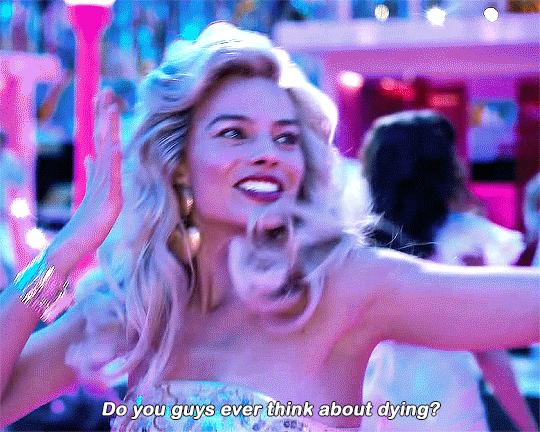
To answer Barbie's question: yes. Yes, I do think about dying. We all think about dying at some point. And perhaps more importantly, our kids are starting to think about dying. I would not be surprised if there is even a single kid out there who has asked this question during playtime through their own Barbie. And for many good reasons. The world is a mess right now. Don't even get me started.
It feels like kids and adults alike are more anxious than ever and this new Barbie can certainly relate to that anxiety, even if it's not necessarily her own (it belongs to the girl playing with her). But it turns out that it's the girl's mom Gloria (America Ferrera) who's really struggling and needs Barbie's help, if only by using Barbie as a means of working through her own dissatisfaction as a working wife and mother.
This movie reminds us that we don't stop worrying about things just because we grow up. If anything, we find more things to worry about as we get older. But adults often don't get the same kind of comfort that we give to children; we're just supposed to suck it up and tough it out, but sometimes all we wanna do is stay in our rooms and play with our toys, just like we did when we were kids. Especially if we're girls, since the world is significantly much harder for us to deal with in a society that constantly polices and critiques girls and women (Gloria's speech about the impossible, and often double, standards imposed upon women is a highlight of the movie and should be required viewing for all humans)
But Barbie helps us feel like kids again.
Throughout the entire movie, Greta Gerwig and her team manage to recapture the joy of playing with Barbies with an obviously loving attention to detail. Barbie Land is that now-rare fantasy world that doesn't require a factual explanation but runs on a strong engine of internal logic that makes sense if you've ever played with dolls.


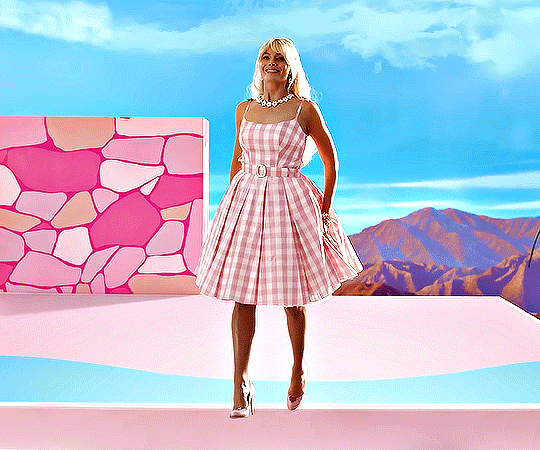
But enough about Barbie.
What about the men?
They're the ones who really have it rough here. Having to deal with all this girly stuff.
Now guys, this might come as a shock, but this movie might not be made for you in mind and therefore you may not get it. You may find yourself confused about why women in this movie are hogging the spotlight and not letting the men do anything important.
But, it's okay, don't worry guys, Ken's got you.

Barbie may be the star, but Ken gets the real emotional journey here. You see, he keeps getting friend-zoned by Barbie, who would rather hang out with her girlfriends and maintain her autonomy than spend the night with him. But once he follows Barbie into the Real World and discovers a magical society where men are in charge and women have to respect them, Ken brings some of these ideas back to the Kens in Barbie Land, thus subjugating all the Barbies to the awesome new patriarchal rule of "Kendom".
Now every night is guys' night.

Folks, go give bonus points to whoever had "Ken gets a villain arc" on their 2023 Bingo card. And while you're at it, add an extra 5 if they also included "Ironic use of a Matchbox Twenty song on the Barbie soundtrack".
Ken's story arc is a powerful reminder of why it's important to critique feminism when it doesn't work.
After all, Barbie Land's matriarchy may seem utopian at first glance, and may even be super inclusive to Barbies of all shapes and races and abilities, but ultimately it is exactly the same as our real world patriarchy, only gender-swapped, with women holding all the power and men being treated as useless accessories. This doesn't balance the scales, it just tips them all the way in the other direction. The only way to achieve true equality is for both men and women to have equal power in society. A conclusion that, thankfully, the movie reaches on its own by the end.
And although Barbie shouldn't have to apologize for not wanting to spend time with Ken or for prioritizing time for herself and her friends, I do appreciate that she was able to make things right with Ken without having to fix things with a kiss or kowtow to his desire to make her his girlfriend. Instead she helps Ken realize that he needs to figure out who he is outside of Barbie, cutting right to the root of toxic/fragile masculinity, which is usually the result of men with low self-esteem just wanting to be heard and respected.
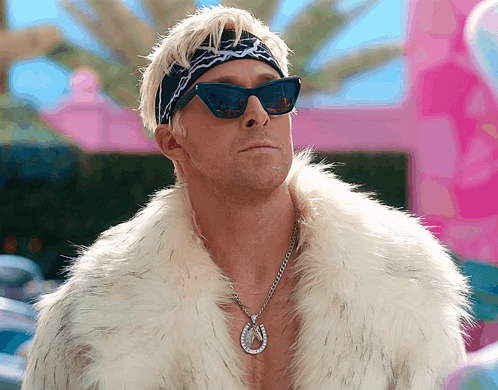
But while Ken is hilariously drawn as a pouty, mostly innocent man child who just wants to be loved (ideally by Barbie), it's a lot harder to laugh off his antics when they result in the Kens actively stripping away constitutional rights and taking over the Supreme Court of Barbie Land. This moment especially should hit just a little too close to home and inspire us to take action.
Thankfully, this movie is not only entertaining and hella meta, but also serves as a practical instruction manual for how girls and women can deal with toxic men and take their power back, whether it's from men in power or obnoxious film bros who constantly espouse the virtues of films like The Godfather and the Snyder cut of Justice League (there's nothing wrong with enjoying these movies, just don't be a dick about it).
It has been a long, time honored tradition in Hollywood for "chick flicks", which is usually code for female-centered films, to be looked down on and mercilessly mocked while elevating more masculine movies to prestige levels. Hopefully Barbie will be the movie that helps us see that "chick flicks" can be just as powerful and impactful as "dick flicks" and then help us reclaim hyperfemininity in our fight against the patriarchy.
After all, would it really be the worst thing in the world if the revolution was not only televised, but also pink?
Listen, if you laugh during this Barbie movie and it happens to make you question and effectively challenge the patriarchy, then all the better.
So will Barbie be that radical watershed movie that inspires a whole generation to believe that the future truly is female or will it just pay lip service to a feel-good you-go-girl message while still maintaining the status quo?
As with any seed we plant, the best we can do is nurture it, give it time, then wait and see what grows.
Come on, Barbie. Let's go party.
#barbie#margot robbie#kate mckinnon#issa rae#hari nef#alexandra shipp#emma mackey#dua lipa#and ken#ryan gosling#simu liu#kingsley ben adir#ncuti gatwa#kenergy#i am kenough#america ferrera#will ferrell#barbie movie#barbie 2023#greta gerwig#noah baumbach#barbie girl#come on barbie let’s go party#barbenheimer
52 notes
·
View notes
Text
Hot Take: The Whale

Guys, I need to get up on my soapbox for a minute.
I honestly don't know if I'm gonna be able to finish this one.
I hate calling this "movie" disgusting because it makes me feel like all the insensitive shits that pick on poor Brendan Fraser, but I truly can't think of any other word to describe my current viewing experience.
Watching this "movie" makes me feel like I'm being hate-crimed.
It is a stain of unpleasantness that does not need to exist in this world.
It's one thing for a film to be boring or unpleasant to watch.
But adding harmful to that mix is a deadly combination.
And I truly believe that The Whale is harmful.
I HATE it when filmmakers use harmful tropes and cliches but still somehow think they're saying something new and profound, especially about subjects that they would know nothing about, and then get rewarded for it, thus ensuring that the vicious cycle of stereotypes continues.
It's unacceptable and irresponsible.
Especially because filmmakers have the power to break that cycle, to say something new or at the very least step aside so that someone else can speak.
There must've been someone out there who could've made this a better movie, who had a better story to tell, to make it a true study of empathy that Aronofsky claimed he was trying to make.
But let's be honest, he doesn't want us to empathize with this character, he wants us to pity him from a place of superiority, to look down upon this poor unfortunate creature, point at his morbidly obese belly, and, if not laugh, then at the very least shake our heads that this being brought such a terrible fate as being fat upon itself.
THIS is why people from marginalized groups need to tell their own stories. THIS is how fat suits become the new blackface.
But I know the Oscars are on Sunday and Brendan Fraser is pretty much guaranteed to get his Oscar. And I want him to get it. I want him to be happy. I want him to get the industry recognition he deserves. Even if it is from an industry that cast him out to the margins in the first place.
I'm not trying to point fingers or place blame in anyone's lap (Lord knows there's been enough of that going on already), but I felt compelled to speak up and give you my opinion.
Do whatever you want with it.
In the meantime, here's some supplementary reading:
For those who don't subscribe to the Times:
4 notes
·
View notes
Text
Hot Take: Pinocchio (2022)
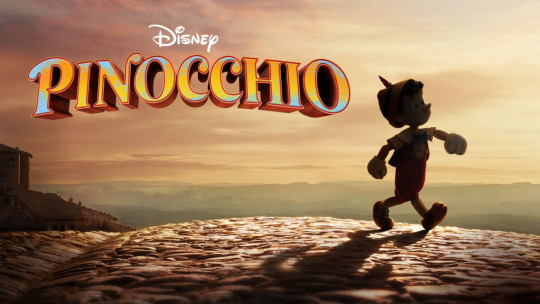
There's a reason why the story of this little wooden boy has been adapted to screen so many times. However, you'd never know what that reason is while watching this version, Disney's latest copy-and-paste "live-action" remake.
I think I would respect Disney so much more if they had just called this the computer-animated version. But then again, maybe not. But seriously, if you're going to call something "live-action" then put in some live action. And no, Tom Hanks gawking awkwardly at you through your TV screen does not count. I really hate bad-mouthing Tom Hanks like this but he and we both deserve better than this:
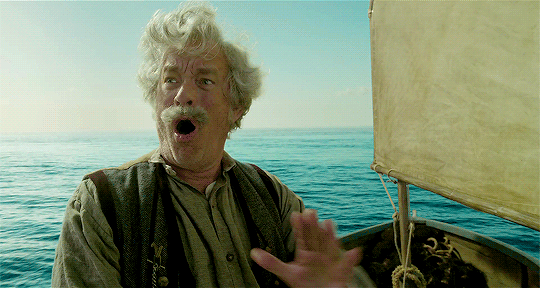
Maybe Disney knew they had a stinker on their hands and that's why they released it on Disney+ and not in theaters. The platform is starting to feel like a dumping ground for projects not anticipated to do well at the box office (don't even get me started on Turning Red, I'm still not over that nonsense).
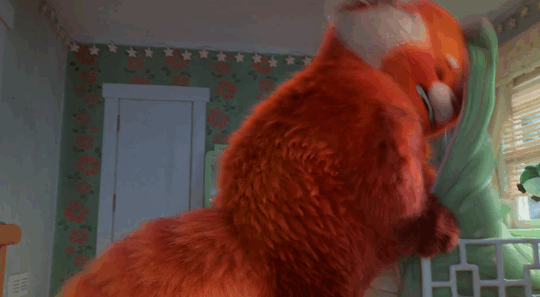
But it's becoming increasingly obvious that the writing is on the wall.
The jig is finally starting to be up. And something's gotta give.
Here's the thing: there's a big difference between being told that something is whimsical and actually witnessing something whimsical. This whole movie feels lazy and condescending, like the corporate equivalent of waving keys in front of a baby's face. I'm not going to laugh just because the movie tells me that something is funny or cry just because they tell me that this moment is sad (Major pet peeve alert: fake-out deaths in Disney movies. In my mind, that's about as cloying and manipulative as it gets.)
Emotions are not something that can be told, they have to be felt. And that's what studios don't seem to understand. They keep trying to wring tears or laughs out of us to no avail. They keep trying to hedge their bets but now they need to start pulling new tricks up their sleeves or start putting actual effort into their projects if they want us to keep watching.
Either way, things need to change.
These movies have no reason to exist outside of making money and banking on our collective nostalgia. But who's the blame here? The studio that keeps giving us garbage or the people who keep watching and, more importantly, paying to watch it? Money talks loudly in Hollywood, no more so than in Disney, and our dollars have told them that this is apparently what we want to see:
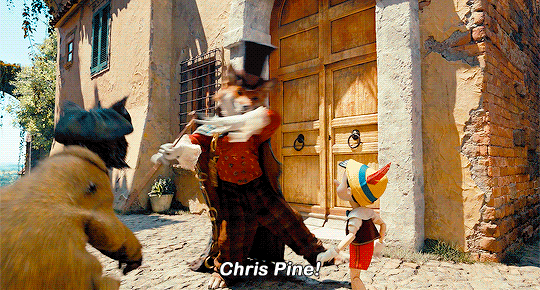
Now with all that said, I do understand the appeal of these remakes, how exciting it can be to see familiar stories take on new forms, and how these movies can provide comfort for people burned out on a chaotic world filled to the brim with uncertainty. I would never wish to take that comfort away from anyone, but I still believe that we can demand better products from our corporations.
After all, they are here to serve us, although it often feels like it's the other way around (aka, backwards).
The sad thing is that this had the potential to not only be a decent remake but an actual good movie. This could've been a golden opportunity to incorporate some outstanding practical effects and use, oh I don't know, ACTUAL PUPPETS in this story about a LIVING PUPPET. If any studio had the resources to make that happen, it's Disney and the fact that they didn't even think to take advantage of such an opportunity is beyond insulting.
Hopefully these remakes can help turn younger generations onto the far superior hand-drawn animated versions and maybe help turn the tide back to 2D animation. These remakes could actually be good case studies of why some concepts work better in hand-drawn animation than in CGI, or even vice versa. I AM glad to see more studios taking the hybrid approach, using the best of both worlds.
But for now, all we can do is pray that Guillermo Del Toro's take on the story, set to be released on Netflix later this year, will give that little wooden boy the proper creative treatment he deserves.

My Rating: 2/5 wishing stars
#pinocchio#pinocchio 2022#tom hanks#geppetto#cynthia erivo#the blue fairy#luke evans#the coachman#giuseppe battiston#stromboli#joseph gordon levitt#jiminy cricket#pinnochio#benjamin evan ainsworth#keegan michael key#honest john#lorraine bracco#disney#disney remakes#disney live action remakes#carlo collodi
19 notes
·
View notes
Text
Let's Review: Nope

*THIS REVIEW CONTAINS MAJOR SPOILERS, SO READ AT YOUR OWN RISK*
This title works on so many levels.
It's short and snappy. It's memorable. It's marketable, It gives us a vibe. It sets the humorous yet ominous tone. And perhaps most importantly, it's an effective bit of reverse psychology. The movie may be called "Nope", a command that encourages us to look away, but audiences are saying "Yep", an affirmation to let us in, we want to see, even if it's terrifying.
Appropriately enough, this movie is all about seeing and looking and the pitfalls of spectacle, the cornerstone of cinema itself.
Nope is Jordan Peele's third outing as director, and it's his biggest, most ambitious film to date in terms of budget, visuals, and thematic scope.
youtube
This could all be seen as early as the first trailer, which was commended for being that now-rare trailer that gives away just the right amount. It was vague enough to peak our interest without revealing too many details.
As anyone who's ever been on the Internet can tell you, there's been a disturbingly common trend of trailers that basically show the entire movie and leave almost nothing to the imagination. Studios have become so risk-averse and it's never been more obvious than it is in the trailers of major studio releases.
When was the last time you were truly shocked or surprised by a trailer? When was the last time you saw a movie where you saw something that wasn't already seen in the trailer?
Fortunately, Peele has always been an expert marketer of his own movies, and Nope is no exception. Even when the final trailer came out and revealed a lot more in terms of the official plot, I'm happy to report that there are still plenty of surprises in store that are not spoiled by the trailers.
As Peele gains more clout in Hollywood, it feels appropriate that his newest movie, a summer movie to boot, offers his twisted take on Spielberg and his most common tropes: ordinary people in extraordinary situations, the fixing of fractured families, and, of course, the Spielberg face.


I am not the first critic to note Peele's parallels to Jaws and Close Encounters of the Third Kind here. But I'm surprised that none of the reviews I read even mentioned War of the Worlds. Nope shares a similar sense of otherworldly dread and visceral body horror with War of the Worlds, especially when we see a UFO dump the blood of its victims on the house of siblings OJ (David Kaluuya) and Emerald Haywood (Keke Palmer).
Spielberg would usually, with some exceptions, dip a toe or two into this type of horror, but here Peele swan-dives into it headfirst. This is the kind of fear that makes us uncomfortably aware of our own meaty bodies and makes us wonder what it would feel like to be consumed by an unknowable, extraterrestrial entity.
And it makes us watch the sky.


And that's exactly the point.
It makes us look.
This is the essence of cinema. The audience's desire to look, the filmmaker's desire to capture the moment for others to see so that it lasts forever. Even if that moment is terrifying.
And that's exactly what OJ and Emerald set out to do: capture the alien. But not in a net. On camera.
After all, how does the saying go? Pics or it didn't happen.
But the main reason why the Haywoods want to "shoot" the alien is to save their business, a black-owned horse ranch that trains and lends horses for films and TV shows. They've fallen on hard times since their father (the incomparable Keith David in a too brief appearance) was killed in a freak accident directly tied to the alien presence. They enlist the help of IT guy Angel (Brandon Perea) and famed filmmaker Antlers Holst (Michael Wincott) to help them capture the UFO on film and ostensibly avenge their father. But here's the kicker: how do you film something that disrupts electrical fields and renders electronic devices useless?
Meanwhile, former child star Jupe (the prolific Steven Yeun), the survivor of a darkly comedic subplot, seeks to profit off of his past trauma as the owner of a hackneyed carnival. Once word of the UFO gets out, he uses the Haywood's horses in an attempt to lure the alien out and draw in an even bigger crowd. His arc serves as a cautionary tale to anyone who thinks that they can tempt fate and mess with forces that they don't understand.
As I'm sure you can imagine, things don't exactly end well for him.

Peele has been credited with revitalizing the horror genre, and I think a key reason to his success is that he understands this essential truth of great moviemaking: the importance of building good characters. This set-up only works if you care about the characters, and Peele has proven himself an expert at creating great characters that we can root for.
We hear people talk about great chemistry between actors all the time, but that's usually reserved for romantic couples. Here the great chemistry is found between the Haywood siblings. As always, Daniel Kaluuya brings his A-game while the effervescent Keke Palmer crushes it in a star-making performance. It's nice to see Palmer, who has always been endlessly likable, put her fast-talking wit and upbeat energy to good use in a role worthy of her talents.

But she also gets to be more than just perky.
Peele really lets Palmer stretch out her acting chops here, and she gets to prove what a powerhouse actor she really is, showing believable shades of fear and tenacity and giving everything she's got into every emotion.


And, as anyone who's seen the film can tell you, there's plenty to be afraid of here.
Peele brilliantly flips our notions of movie aliens on its head when it's eventually revealed that the UFO, usually seen as the vehicle used to carry the aliens, IS in fact the alien itself, eventually named Jean Jacket by the Haywoods. Jean Jacket only attacks people who look at it directly and, to top it all off, it just so happens to spend most of the movie looking like a floating eyeball.
How apropos for a movie about looking.

This whole movie feels like car accident: something horrific unfolding in front of our eyes that we can't stop watching. And yet it draws it such a big crowd.
What can I say? We just can't help but look.
My Rating: 4/5 Jean Jackets
#nope#nope 2022#jordan peele#daniel kaluuya#keke palmer#steven yeun#brandon perea#michael wincott#wrenn schmidt#keith david#barbie ferreira#monkey paw productions#Youtube
35 notes
·
View notes
Text
Let's Review: Where The Crawdads Sing

*CONTAINS SPOILERS FOR BOTH THE BOOK AND THE MOVIE. READ AT YOUR OWN RISK.*
If we have learned anything from the 2020s, it's the pain of isolation. The pain of being cut off from our families and friends. The pain of loss. The pain of feeling so invisible you start to wonder if you're even really here at all. The pain of living with that raw, gaping hole in your soul we call loneliness. And yet that space can also be a place where we can be free, a garden from which we can regrow and nourish ourselves.
Anyone who's ever read Thoreau or Emerson can tell you that nature and solitude are often bosom companions; It is a partnership that can create ideal conditions for sowing resilience and self-reliance.
We see these themes take new root in Delia Owens' bestselling novel Where the Crawdads Sing, now a major motion picture.

The story is about the life of Kya, one of the most memorable literary heroines ever written. In the North Carolina town of Barkley Cove, she's commonly known as the Marsh Girl due to her solitary and secluded life in the marsh found outside of town. But they don't really know her at all. It's one thing to live a solitary life by choice, but it's quite another to have that life thrust upon you, forcing you to adapt or die. This is Kya's burden to bear as she is slowly abandoned by her entire family, leaving her alone to learn how to survive and etch out a living for herself in the marsh. But one day her quiet life is abruptly interrupted when she finds herself charged with the murder of Chase Andrews, a local golden boy, and has to face trial at the hands of a town that hates and misunderstands her.
Daisy Edgar-Jones delivers a high profile, career-boosting performance as Kya, giving her all the Southern grit and vulnerability that the character deserves. The rest of the supporting cast is pretty solid, but the stand-outs for me have got to be newcomer Jojo Regina as Little Kya and veteran David Strathairn as Kya's genteel yet down-to-earth attorney Tom Milton.
Kya's journey feels like an updated retelling of another classic southern story: To Kill A Mockingbird. They are both stories that focus on a tomboyish girl struggling to fit in and make sense of the world around her; they're also both courtroom dramas centered on a sympathetic but socially reviled character.
But this time around, the heroine is not Scout, it's Boo Radley.


Where the Crawdads Sing offers a sympathetic look at a successfully self-sufficient female recluse, a rarity in mainstream narratives. The story frames her in a favorable light and shows us what happens when we see things from the local boogeyman's perspective (or boogeywoman in this case).
We get to understand her loss, feel her pain right alongside her, and admire her intelligence and talents.

Through her eyes we get to see the beauty of the marsh. The novel is rich with beautiful poetic imagery about the natural world, and we get to see a great deal of that reflected on film.



But Kya is also cinema's latest incarnation of the often outdated wild woman trope. These figures are outsiders, cast out of their societies, usually as a result of familial abandonment, and often find themselves joining marginalized communities (Kya is mainly solitary but she does rely on the kindness of Jumpin' and Mabel, an African-American couple). The wild woman is framed as pure, simple, un-nuanced, naive or unaware of social niceties, and therefore uncorrupted by human society, which has allowed them to remain innately good. But they are also seen as desirable specifically because they are viewed as "wild" (i.e. independent) and "dangerous" (mostly for failing to conform to gendered expectations and uphold patriarchal values) and therefore need to be "saved" or "tamed" by men in order to become "civilized" (i.e. married, child-bearing, and domestic). These narratives frame the woman's independence from society (i.e. men) as a detriment, an affliction that needs to be cured immediately. These women are usually softened or "redeemed" through the unsolicited efforts of a man. She's usually not looking to be tied down by anyone, but usually gives in after some initial resistance and this is often framed by the narrative as a success on the man's part, regardless of the woman's needs or desires.
Think Stands With A Fist from Dances with Wolves with her wild hair (because how else would we know she was a wild woman?) or San from Princess Mononoke (who's still a great female character but still checks off most of the aforementioned boxes).


For the most part, Kya's story does an excellent job of showing us how resilient and independent she is as her own person and largely side-steps the worst parts of the trope. But unfortunately, she still stumbles into the trap when it comes to the romance subplot and the "love triangle" that waters down an otherwise strong character arc.


Now there's nothing inherently wrong with female characters who need to rely on men in order to become stronger or desire romance in order to be loved. Kya's relationship with Tate is sweet and subtly subversive (they never get married or have children) and I do enjoy seeing them grow old together. Plus, there is something darkly fascinating about Kya going after Chase, a guy who's clearly no good for her, from an ethological standpoint.
But this all means that Kya's life is still centered mainly on the men in her life, whether it's her romantic interests or her male family members. There's even a troubling implication that Kya's existence is validated by these men; in the trailer and in the movie, when Kya bemoans how invisible she feels and wonders if she's even really here at all, Tate answers "You are." which could subtly suggest to the audience that Kya can't feel seen in her own right unless she's being acknowledged by a man. Although Tate does appreciate Kya for her intelligence and her abilities, his interest in her, at least according to the novel, stems from her being "not like the other girls", which is a whole other thing I have no time to get to in detail here.
Maybe I'm reading too much into this.
But maybe not.
It would've been nice to see Kya cultivate some female friendships (maybe a girl in town who was curious about her) or find a few female role models or maybe even serve as a role model to another marsh girl. We see a little bit of this with Kya's relationship with Mabel, who helps Kya learn about numbers and how to shop for herself, but it's brushed aside pretty quickly and gets no real development. We do get to see that Kya had a good relationship with her mother, but she swiftly leaves the story, never to be seen again except in memory.
It also would've been cool to see Kya explore her femininity, gender presentation, and sexuality on her own terms without it being largely left to others and to men as we see in both the novel and the movie. However, we do get to see her perspective on losing her virginity to Chase and see on her face how uncomfortable and impersonal it is.
Bottom line: we need to see more Kyas in our literature and hopefully in the future they can be even better characters and learn from the example set by the novel and the movie.
The movie is very faithful to the novel, except for some omissions (most notably Amanda Hamilton) and narrative restructuring: the trial acts as a framing device for the movie, introduced right away as opposed to being sprinkled sparsely into the narrative up until the third act, where it serves as the climax in the novel. This change works well for the movie and gives Kya a reason to tell her story.
This is definitely a book club movie night kind of movie, one where you read the book (or in my case, listen to the fantastic audiobook) in anticipation, go see the movie with friends who've also read the book, and then have long discussions about it afterwards.
It's been a long while since we've had a cinematic event like this, and I think that's worth celebrating.
Whether you love it or hate it, it's still a fun night out either way.
My Rating: 3/5 crawdads
#where the crawdads sing#delia owens#hello sunshine#reese witherspoon#reese's book club#hello sunshine book club#daisy edgar jones#kya clark#chase andrews#harris dickinson#tate walker#taylor john smith#michael hyatt#sterling macer jr.#david strathairn#garret dillahunt#ahna o'reilly#carolina#taylor swift#olivia newman#lucy alibar
13 notes
·
View notes
Text
Let's Review: Elvis

*THIS REVIEW CONTAINS SPOILERS AND SOME THIRSTINESS*
Biopics are a unique genre of motion picture. Not quite fiction, not quite nonfiction. Factual and false at the same time. An elaborate magic trick attempting to re-create historical moments and bring famous (usually dead) figures to life before our eyes. It's a fickle kind of alchemy, one that can easily go wrong. Stick too closely to the facts and it becomes a documentary, not a movie. Stray too far, it becomes unfaithful to the subject and unrecognizable as their story, so why even bother making a movie about them at all?
I'm just gonna say up front that I am NOT going to spend this review fact-checking every historical inaccuracy.
Because what most people always forget is that biopics are MOVIES. Therefore they should be judged as movies. And movies are supposed to entertain us. Movies thrive on emotional manipulation, which often means having to tweak the timeline, move things around, fabricate events, and conflate key players in order to make the story work.
It is a Herculean task to try and fit all of a person's complexities, personal details, and every single significant event in that person's life into a single feature length film. It would take dozens of movies to do justice to any person's life, especially when that person is one of the most famous and influential entertainers of all time: Elvis Presley.

Luckily for us, Baz Luhrmann is the right man for this job.
His signature brand of spectacle and flair for excess (seen in earlier outings such as Romeo + Juliet, Moulin Rouge! and his adaptation of The Great Gatsby) are a perfect fit for telling Elvis Presley's life story. His style fits his subject like one of Elvis' trademark jumpsuits.

Elvis covers the rise and fall of Presley's career, from humble beginnings in the late 50s to his untimely death in 1977, as told by his unscrupulous manager Col. Tom Parker, bafflingly played by Tom Hanks in a fat suit. It is such an odd casting choice to have America's Dad portray such an unlikeable, unsympathetic man and to have this guy serve as our main narrator and conduit into the life of Elvis. Do we really want this guy whispering in our ear, failing to convince us that he didn't kill Elvis? Wouldn't it be better to have Elvis himself, or quite frankly anyone else, tell us the story of Elvis?
But I think I see what Luhrmann was trying to do here.
He consistently frames Parker as, to quote one of Elvis' song, "the devil in disguise". We see this as early as Parker's first face-to-face meeting with Elvis, set inside a carnival hall of mirrors and on a Ferris wheel. Needless to say, this never actually happened (okay, this is my one and only correction). However, it is a good scene from a storytelling perspective because it creates great narrative tension; we see Elvis make what feels like a Faustian bargain with Parker, who is indeed the devil on Elvis' shoulder all throughout the movie, urging Elvis to get out there and keep performing no matter what, even when it ends up costing Elvis his dignity, his health, and ultimately his life. It becomes obvious to us that Parker is essentially an organ grinder who keeps trying to turn Elvis into a dancing monkey. But the events we see actively contradict Parker's subjective narrative and Elvis successfully defies him several times throughout the movie. So the narrative is clearly on Elvis' side and our sympathies are always with Elvis all throughout, exactly where they should be. We see how burned out Elvis was towards the end of his career, sweating profusely and doped up on drugs. Luhrmann makes a strong case that, if Elvis had been able to take a break and break free of Parker, then he would most likely still be alive today.
Elvis works best when we see and feel things from Elvis' perspective, both the highs and the lows. And it takes a special sort of person to pull off that kind of vulnerability.

Actors in biopics have to walk a very fine line between impersonation and performance, between playing a part and playing dress-up. So casting the right actor is key. Cast the wrong person, and the illusion is ruined before it's even begun. Cast someone too spot-on, and the effect is unnaturally uncanny, especially if they don't have the talent to match. Far too often, we see actors try to forcefully fit themselves into the role, like one of Cinderella's stepsisters trying to stuff their feet into the glass slipper. And at almost every awards season we see actors getting accolades and industry recognition for simply looking and sounding like the real-life person that they're portraying, and that's it.
But there's a big difference between impersonation and acting.
It's one thing for an actor to wear the clothes, do their research, and perfect the accent, but in order to achieve true greatness they have to do something more, something that transcends acting. They have to wear that role like it's their own skin and carry themselves naturally within it, as though they were born doing it. They have to become the subject in body and soul. When done successfully, we don't even see the actor portraying the person. We see the person.
Austin Butler does all of that successfully and then some.
To put it bluntly, this guy can talk the talk AND walk the walk.


I'm telling you right now, Butler is going to be the one to watch out for this upcoming awards season, and for all the right reasons. He's sure to earn plenty of nominations, and hopefully win at least a few statuettes. And even if he doesn't win a single award, this is still a star-making role for him, and he'll have earned every inch of that recognition.
It's one thing to have a passing physical resemblance to Elvis, which Butler definitely does, but to be able to move and sing and sound exactly like Elvis? Now that's something.
It would've been so easy for anyone playing Elvis to make it a bad impersonation, to just do the voice, say "thank you very much", and simply go through all the motions (and I do mean all the motions) without giving him any depth or personality behind it.
But Butler plays Elvis, in every shade of his career, with the right rock-and-roll swagger and a confident charisma that exudes, there really is no better word for it, star quality.
It's the kind of thing you can't teach. You either have it or you don't.
And boy does he have it.
Butler also does something else that's important here.
He reminds us that Elvis was sexy.

There's a reason why Elvis was a sex symbol. Why girls shrieked, openly wept, and threw their panties at him.
Seriously, just watch him sing "Trouble" and then try to tell me that it doesn't make you feel some kinda way.
Just TRY it. I dare you.
He is giving us 110% out there and you can see every bead of sweat on screen. You can't fake that kind of sweat. That sort of sweat only comes from actual hard work, from giving it your all, letting go and completely losing yourself to the moment.
Now that's commitment.

Not bad for a guy whose career started out on Nickelodeon and the Disney Channel. I'm not saying that to badmouth him or drop any shade; I just think it's awesome that young actors who get their start on those platforms are finally getting the chance to grow up and be successful playing more challenging and mature roles. Just look at Zendaya on Euphoria or Aidan Gallagher on The Umbrella Academy.
It's almost a little scary how seamless this performance is. There's a moment at the very end where the movie cuts from Butler as Elvis singing "Unchained Melody" to the real Elvis singing the song and I swear to God there was a moment when I couldn't tell the difference. It just so happens that that song is the song that Butler auditioned with to earn him the role, and it was the last great vocal performance of Elvis' career before he died. Oh, and it turns out that Butler and Presley are 16th cousins once removed (according to IMDB, Presley' dad and Butler's mom share some common ancestry).
Talk about uncanny.
Well, no matter how distant that relation might be, the resemblance shines most brightly through Butler during the electric song sequences, which are galvanized by energetic editing, each cut timed flawlessly to the music.

Any editor working with Baz Luhrmann is going to be put through the wringer (I'd like to take a moment to give props to Jill Bilcock for putting together the chaotic split second cuts in Moulin Rouge! Whoever stole her Oscar that year owes her an apology), but fortunately Luhrmann has finally learned how to chill out when it comes to editing his movies, while still giving them the right amount of pep. I'd like to give a quick shout-out to Matt Villa and Jonathan Redmond, who both edited Luhrmann's The Great Gatsby, for their contributions to Elvis. I feel like the editing is a big reason why the 2 hour, 39 minute runtime felt as breezy as it did for me (your mileage may vary here).
I'll even go so far as to say that Elvis is Luhrmann's best film to date.
Mainly because it represents the best of his talents and a cumulative honing of his craft. The movie does an excellent job making us understand Elvis' appeal and what was so controversial about him, how strange he looked and how exciting he sounded compared to the tamer, cornfed country stars he was surrounded by. He was Beatlemania before the Beatles even showed up. And his music was able to cross the color line like nothing else that had come before it.
And here we have to address the elephant in the room: Elvis gaining popularity as the King of Rock and Roll for recording songs that were originally sung by black artists and for gaining fame as a white boy who "sounded black".
So was Elvis guilty of cultural appropriation? The movie argues that it was more appreciation than appropriation, showing us how Elvis grew up in a predominantly black neighborhood, was in awe of black artists, and took inspiration from black singers such as B.B. King, Arthur Crudup, Little Richard, Sister Rosetta Tharpe, and Mahalia Jackson. Remarkably, the movie makes Elvis check his own privilege within the narrative, commenting on how, even with the threat of jail looming over him, Elvis can still get away with things that black singers cannot, and Elvis uses his music to fight back against racist conservatives. The fact that this film acknowledges Presley's white privilege at all is a kind of accomplishment, albeit one that clears the lowest bar. Nevertheless, the cast and the soundtrack does spotlight some talented black talent, including Gary Clark Jr. as Arthur Crudup and Yola.
If you're interesting in learning more about cultural appreciation vs appropriation than give this article a read at your leisure.
Ultimately, Elvis the movie is more about Elvis the myth than Elvis the man. But his movie is only one facet of the diamond that is Elvis Presley. It gets some things wrong but gets a lot of things right.
Either way, it's one hell of a magic trick.
My Rating: 3.5/5 pompadours
Bonus Content: Behold, the most adorable thing on the planet. And puppies. Enjoy!
youtube
#elvis 2022#elvis presley#baz luhrmann#austin butler#tom hanks#col tom parker#priscilla presley#olivia dejonge#richard roxburgh#kelvin harrison jr.#bb king#david wenham#kodi smit mcphee#dacre montgomery#gary clark jr.#lisa marie presley#riley keough#yola#Youtube
2 notes
·
View notes
Text
Let's Review: Thor Love and Thunder
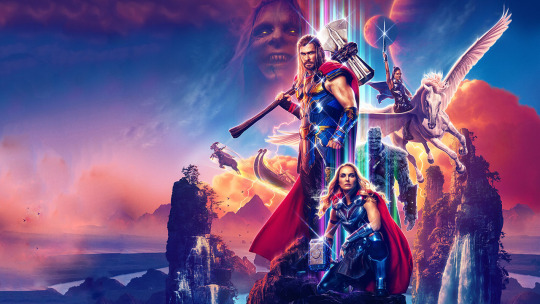
*THIS REVIEW CONTAINS SOME SALTY LANGUAGE AND SPOILERS FOR THOR: LOVE AND THUNDER*
It has been said, many times by many people, that comic books and comic book movies are our new modern mythology and superheroes are the new gods and goddesses of that mythology. Well, it's very easy to make that case when the heroes of your comic book movie are literally figures from Norse and Greek mythology, such as Thor and Zeus. These gods were indeed the first superheroes, so things come full circle here, an ouroboros of inspiration that sees these classical deities donning capes and, occasionally, saving the day.
But if the opening of this movie teaches us anything, it's that the gods are still as petty and powerful as ever.
We start off Thor: Love and Thunder with, of all people, our main villain Gorr, played with equal parts brooding gloom and sadistic glee by DC defector Christian Bale, as he loses his daughter and begs for help from his god. But his pleas fall on deaf ears, leading Gorr to take up the god-killing Necrosword and become Gorr the God Butcher.

While Gorr is not exactly a top-tier Marvel villain (that title still belongs to Thanos and Killmonger), Gorr is definitely a higher tier Marvel villain that comes close, thanks in large part to this opening. It reminds us that the best villains are those that think that they're doing the right thing; they have a persuasive worldview informed by relatable pains caused by shortcomings of the world around them. They do what they do in order to take back some control and change their circumstances. And although avenging the unjust death of a loved one is not exactly new when it comes to villain or antihero motivations, we can relate to that feeling of being let down by a supposed higher power who not only refuses to help you, but flat-out tells you that your existence is pointless, that there is nothing meaningful beyond this life, and you were a fool for believing that there was in the first place. And yeah, the gods can be pricks sometimes and they do deserve to be punished and wouldn't it be nice to knock them down a peg or two? It's a very appealing notion, one that Gorr is more than happy to take advantage of.
Especially when you look at someone like Thor.

Now don't get me wrong, Thor has changed and grown a lot over the course of his movies and throughout the MCU, but even now he can still be a bit oblivious. Most of the time that's what makes him so lovable but sometimes it can ring hollow when you put him next to characters who are dealing with actual problems, as we will see with his ex-girlfriend Dr. Jane Foster, played by Natalie Portman (who FINALLY gets to have some fun in a Thor movie), and *MAJOR SPOILER COMING UP* her struggles with stage 4 cancer.
Thor's biggest personal obstacle in this movie is his own masculine insecurity, which is fitting for a guy whose sense of self-worth is measured by the size of his biceps (rumor has it that Chris Hemsworth achieved his biggest physique yet for this movie). That struggle takes many forms, ranging from getting back into shape after the events of Avengers: Endgame (because Gods forbid we have a fat Thor, am I right?) to dealing with the return of Jane, who has taken up the mantle of Mighty Thor and has assumed ownership of the reconstructed Mjölnir.
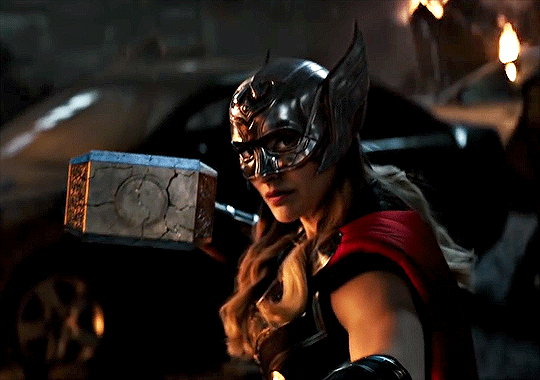
Although it's exciting to see Jane really step up and become a proper hero in her own right, her journey puts a spotlight on Marvel's ever-present problems that they still have with their female characters.
First off, Jane only gets to be powerful because she is a cruel victim of fate, getting this aggressive form of cancer out of nowhere just so she can become Mighty Thor by borrowing the tools and persona of her male counterpart in order to regain her vitality. This basically makes Jane a Smurfette figure despite her obvious strengths and her insistence on being called Mighty Thor, not Lady Thor. But her power and superhero status is achieved by essentially being a direct extension of her ex-boyfriend. Thor gets to be Thor, but Jane has to contend with being Lady Thor. Granted, this is handled fairly well in the movie and none of the characters really express any problems with this. After all, Valkyrie gets to be King of New Asgard and it's a non-issue. Between this, Florence + the Machine's song "King", and the upcoming Viola Davis flick The Woman King, it's nice to see that our mainstream media is actively trying to make the title of King a gender neutral term.
Speaking of Valkyrie, she and Jane are the real heroes here. They're the ones making battle plans and staying on task and holding their own alongside Thor.

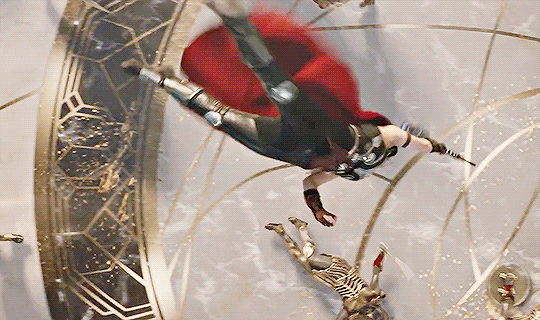
I would even argue that Jane has better chemistry with Val than she ever did with Thor, who's too busy whining that his ex-weapon Mjölnir doesn't like him anymore while trying to appease Stormbreaker (which I have to admit is pretty hilarious).
Bottom line: Jane and Val display major BDE, or in this case BHE (Big Hammer Energy) in this movie, and for that they deserve our respect.
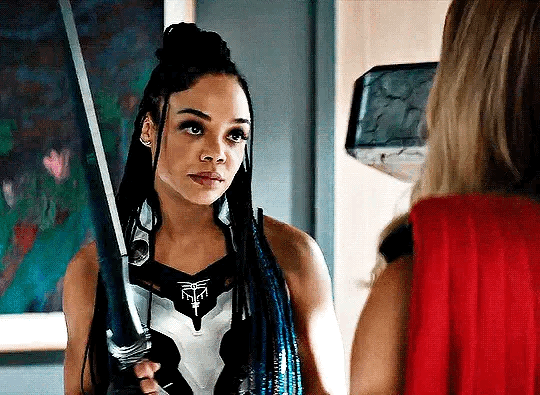
However they both still get viciously sidelined, albeit briefly in Jane's case, right before the climax despite proving themselves to be extremely capable warriors several times over. This turn sends the implicit message that, while women can be powerful, it's best that they're not too powerful, lest they overshadow the men.
Just look at what happened to Black Widow (fridged), Scarlet Witch (villainized), and Captain Marvel, who although not victimized in the same way as other female Avengers still earned endless vitriol for essentially being more powerful than the boys. So when it comes to female heroes in the MCU, they can either be all-powerful and lose their humanity (again, see Scarlet Witch) or have some power (but again, not too much power) before ultimately getting sidelined, sacrificed, damseled, disempowered, or killed off.
But with all that said, Jane does get her best character development in this movie and, like I said earlier, she actually gets to have some FUN here. We get to see her actively owning and enjoying her newfound power while adorably trying out different superhero catchphrases. She gets to be strong and weak in equal measure without diminishing her power, thus avoiding the trap of the tired Strong Female Character trope. She gets to be goofy, gets to figure herself out, gets to share that enthusiasm with her comrades, and gets to have an awesome bromance with Valkyrie, cementing a strong female friendship with a fellow female superhero.
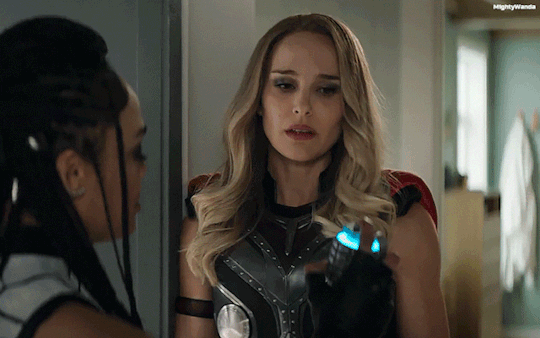
She also gets to have a great story arch worthy of any hero. *MAJOR SPOILERS COMING UP* We learn that, although Mjölnir grants Jane better health, strength, and stamina, her body becomes unable to fight off the cancer whenever she's not using the hammer, and it gets worse every time she uses it. During the climax, we see her make the ultimate sacrifice by taking up Mjölnir one last time to deal the final blow against Gorr before succumbing to the cancer and dying in Thor's arms. This death feels like a cog in the Marvel machine, which sees characters come and go based on the availability of their actors. But it was nice to see that in the post-credits scene Jane is greeted by Heimdall and welcomed with open arms into the halls of Valhalla, earning the reward of a true hero. *MAJOR SPOILERS END HERE*
This movie is such a mixed bag of steps forward and steps backward when it comes to feminist representation. The female characters are both central and peripheral here, but overall it's definitely moving in the right direction and I, for one, would like to acknowledge that fact. This movie offers an abundance of hope for the next generation and it's exciting to think of all the girls and women (and others) who'll start cosplaying as Mighty Thor in droves for cons and for Halloween, having been given unspoken permission by this movie to do so.

On another note, I am happy to report that Thor: Love and Thunder has the best queer representation of any Marvel movie yet. To quote Mighty Thor, this movie really brings the rainbow. *SPOILERS COMING UP* We get verbal confirmation that Valkyrie had a girlfriend (albeit one who was unnamed and killed off and doesn't appear onscreen), thus fulfilling the studio's promise to make the character openly bisexual (while still putting out a cut of the film that can be easily censored to appease homophobic countries); plus we see her chivalrously kiss the hand of one of Zeus' handmaidens while making bedroom eyes, so that's something I guess. We learn that Korg has two dads and gets a boyfriend by the end of the movie. We get to meet Heimdall's son Axl, who tells us that he used to be called Astrid, and although it's never confirmed canonically that Axl is trans, he's definitely coded as such. Either way, I was shocked to see Thor deadnaming this kid as a joke, which, I can't believe I have to stress this, is NOT OKAY. Despite this, Axl gets to play an important part in the story, taking up a leadership role amongst the children who are kidnapped by Gorr and getting to fight alongside Thor with them in the final battle. *SPOILERS END HERE*
Marvel movies are at a critical tipping point right now, and if they hope to stay prevalent and relevant, they're going to have to start shaking things up. The Marvel formula is starting to get stale and it'll need to get thrown out and replaced with something fresher very soon, or else we'll going to start consuming something else.
This has never been more obvious than it is in Thor: Love and Thunder. The vibe for Love and Thunder, just like it was in Ragnarok, is bright and outrageous, like those spray-paintings on the sides of vans showing unicorns and sorcerers. But that painting is starting to fade around the edges. That classic brand of Marvel humor is starting to get old (i.e. those goddamn yelling goats) and has been reduced to poking fun at Disney themed parks, as we see in New Asgard (but, to be fair, it's also poking fun at New Zealand aka Middle Earth, which tracks because director Taika Waititi is from New Zealand, so he gets it). It was hilarious to see those Asgardian actors at it again, and now it makes me want to see a spin-off starring them, just so I can see what they do in their downtime outside of work.
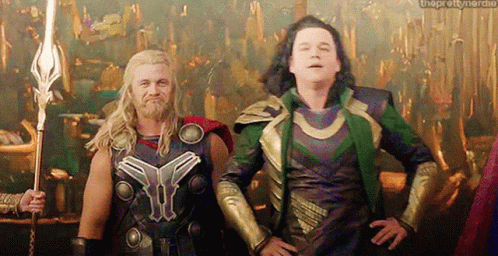
At the end of the day, you can still rest assured that this movie will have plenty of love and thunder in equal abundance. It's still a good time, you'll still laugh at the jokes, you'll still enjoy hanging out with some of your favorite characters (we even get to see 2 out of 3 Marvel Chrises when Starlord and the Guardians of the Galaxy briefly show up in the beginning), you'll still enjoy the action scenes, the colors and visuals are still amazing (especially when our heroes get to the Shadow Realm in a sequence that's visually on par with the slo-mo flashback of the Valkyrior battle against Hela in Ragnarok), and you'll still bob your head to the soundtrack, which slaps pretty hard although the one big strike against it is the overwhelming lack of AC/DC's "Thunderstuck"; I mean COME ON people, it's fitting for both the God of Thunder AND all the Aussies in the cast. The last thing I'll say about that is if (i.e. when) they make another Thor movie, it would be really cool if it could find its way onto the soundtrack.
Either way, it's nice to see that Thor can still bring the thunder.
Thanks for reading!
My Rating: 3/5 thunderbolts
#thor love and thunder#thor#mighty thor#chris hemsworth#natalie portman#the mighty thor#jane foster#valkyrie#tessa thompson#valkyrie x jane#korg#taika waititi#christian bale#christian bale gorr#gorr the god butcher#zeus#russell crowe#guardians of the galaxy#chris pratt#thor x peter#thorquill#star lord#groot#new asgard
45 notes
·
View notes
Text
Let's Review: Marcel the Shell with Shoes On

*THIS REVIEW CONTAINS SPOILERS*
We start our lives small, but then as time goes by we get bigger. Most of us forget what it's like to be so small, not just in terms of physical size but also in terms of our worldview, because back then our world and our view used to be as small as us. But small things can be invaluable specifically because they are small. Being small comes with its own unique perspective. As we grow up, the trick is to take that perspective and hold onto it as we become adults without breaking it or losing it. Not unlike a small shell that is both beautiful and frighteningly fragile.
This movie makes us feel small again.
And that's not a bad thing.
But feeling small can be depressing. For most people, regardless of age, small equals insignificant, especially when we're faced with an infinite and at times indifferent universe.
But if you've ever felt small, just imagine what it must feel like to be an inch tall shell with one eye and no arms.

Marcel the Shell reminds us that small doesn't have to mean insignificant.
Marcel the Shell with Shoes On is the feature film debut of the eponymous talking shell, the stop-motion star of a small series of live-action shorts that went viral on YouTube starting back in 2010. Each short would put Marcel inside a big empty house, where he would either talk directly to the filmmaker or go on little adventures such as showing us his "bread"-room or taking his pet lint out for a walk. Marcel's antics and witticisms ("Guess what I do for adventure. I hang glide on a Dorito.") can easily stand toe-to-toe with the best of Calvin and Hobbes or a Peanuts comic strip.

Marcel is like Calvin's soft-spoken little brother, curious and wry and adventurous, with a dash of endless optimism to boot.
It's easy to see why Marcel and these shorts became so popular and why they appeal to both kids and adults. Marcel's genuinely unassuming demeanor, endearing quirks, hilariously blunt statements and observations, surprisingly profound quips ("Guess why I smile a lot. Uh, because it's worth it"), and unbreakable spirit make him an extremely lovable character and the unlikely star of a major motion picture.

The plot of the film, like our little protagonist, is small but steadfast and subtly insightful. The film's director, Dean Fleischer-Camp (who also directed the shorts), plays a fictionalized version of himself who spends most of his time offscreen documenting the daily lives of Marcel, voiced with incredible tenderness by Jenny Slate (Fleischer-Camp's real-life ex-wife who voiced Marcel in the shorts), and his grandmother Nanna Connie (an original character created for the film), voiced with loving warmth by Isabella Rossellini. Both the character and Rossellini are pleasant additions to Marcel's world. She gives the story an added emotional weight worthy of a feature length film, sharing her valuable insight into Marcel with us and acting as a source of unconditional love and comfort for the young shell. Her presence reminds us that Marcel, despite his self-assuredness, is still just a kid, carrying a heavy emotional burden on his tiny shoulders.

We find out that the rest of Marcel's family was taken away from them several years ago when the previous occupants accidentally packed them in a suitcase and left unexpectedly. Yearning for a community, he sets out to find the rest of his family.
The film accomplishes that often elusive goal of remaining loyal to the spirit of its source material while expanding that initial premise into a story that fits and feels natural to that world. It helps that the original creators were able to be involved and keep it simple, steering clear of typical family movie contrivances such as a clear-cut villain, a convoluted explanation for why Marcel and his family are alive, loud and mindless candy colored visuals, a needlessly complicated plot that tries to be narratively sophisticated, dated pop culture references underscored by today's most popular pop songs, and of course potty humor.
But things do get meta when Fleischer-Camp's videos make Marcel a viral sensation online. They channel that influence by live-streaming and asking for help with finding Marcel's family. The film expertly shows us how, when working towards a common goal for the greater good, the internet can be a very powerful tool that can instantly provide helpful assistance in real time; but it also warns us that that same online community can also be fickle and detrimental. We see some fans taking selfies in front of the house and showing little to no interest in actually helping Marcel. This plot point almost threatens to upend an otherwise timeless story and steer it into "kids movie" territory, but fortunately it comes and goes pretty quickly, leaving an important moral for younger viewers in its wake.
Marcel the Shell with Shoes On falls into this unique category of family film, one that's become so rare because it can be so hard to pull off effectively without feeling contrived. It's a kid-friendly film that doesn't obviously market itself to kids in the same way that Disney or Illumination films often do. It's the kind of movie that goes back to basics and this can be seen in something as simple as the environment, which mostly takes place within a largely empty house, with the camera down on Marcel's level as he uses a hollowed-out tennis ball to get around or walk up the walls with sticky honey-soaked shoes. If other kid's movies like Minions can be compared to a fancy HD TV, then Marcel the Shell with Shoes On is the cinematic equivalent of playing in the big cardboard box that the TV came in. If you've ever seen a little kid play inside a cardboard box, then you know that it can be more than enough to entertain them.
Marcel's world exists in this fascinatingly liminal space. The house they live in is both empty and full at the same time, an Airbnb occupied by the filmmaker (who's dealing with the end of his marriage) and his dog Arthur, plus Marcel and Nanna Connie and a small family of spiders that all look suspiciously like fellow adorable, squeaky-voiced internet star Lucas the Spider. This liminal space is also emotional, existing between joy and sadness, work and play. It takes a lot just for Marcel to get around (that alone would be enough to discourage most people and make them give up), and he has to entertain himself with whatever is around, which is something that he's usually able to do quite well.

We spend a lot of time watching Marcel explore his minimal world and find ways to live a fulfilling life within that space. Although it's never mentioned explicitly, the shadow of COVID-19 lingers like a ghost in the corners of this film. Marcel's attempts to fill his days with fun and productive activities while stuck at home is a sobering reminder of what life was like during quarantine in the early stages of the pandemic, a time when most of us were often physically separated from friends and family members.
Despite Marcel's adorable appeal and hilarious antics, there is an undeniable core of sadness at the center of this story. Marcel and Connie live a very quiet life and that silence is made all the more deafening by the absence of their loved ones. As Marcel says, the space inside his heart gets bigger and louder every day, a feeling that I, and I'm sure many others, can relate to. For the most part, it's his ability to make the best of his situation and still be happy in spite of it that endears him to us and makes it easy to root for him.
But that sadness is made even more pronounced by *MAJOR SPOILER COMING UP* Nanna Connie's slowly deteriorating mental state and failing health. Although she puts on a brave face for Marcel, it quickly becomes obvious that Nanna Connie is not going to be okay, and she eventually dies offscreen. The death of a loved one is nothing new in family films (take your pick of any ill-fated Disney parent) but here it's handled in such a tender and realistic way that you almost forget that it's happening to a shell. There are no melodramatic manipulations, no big speeches or swelling music, no stoic sacrifices, just Nanna Connie slowly disappearing into the background.
Now I don't cry easily at movies, but I bawled my eyes out when I saw Marcel crying and literally standing in a puddle of his own tears (I'm tearing up now just thinking about it). I cannot stress this enough: BRING TISSUES. *MAJOR SPOILERS END HERE*


Marcel the Shell with Shoes On is a gentle film that eases its audience into the sadder parts of the story without overwhelming us or letting us stay sad for too long, while still acknowledging and validating our feelings. Like Nanna Connie, the film holds our hand in order to help us feel safe and guide us across that ever-present void of loneliness and isolation.
This is a great movie to show to anyone, kid or teenager or adult, who is dealing with grief or coping with the loss of a loved one. It gives us a very comforting message that, yes, death is sad and it's scary but it's okay to cry because you will come out of it on the other side and you will be okay.
There are some heavy rainclouds but by the end the sky clears and you'll be smiling from ear to ear.
Thanks for reading.
My Rating: 5/5 anthropomorphic shells
Bonus Content:
Here are the original shorts that the movie is based on. Enjoy!
youtube
youtube
youtube
#marcel the shell with shoes on#marcel the shell#jenny slate#isabella rossellini#dean fleischer camp#rosa salazar#thomas mann#lesley stahl#a24 films#Youtube#60 minutes
36 notes
·
View notes
Text
Let's Review: Lightyear
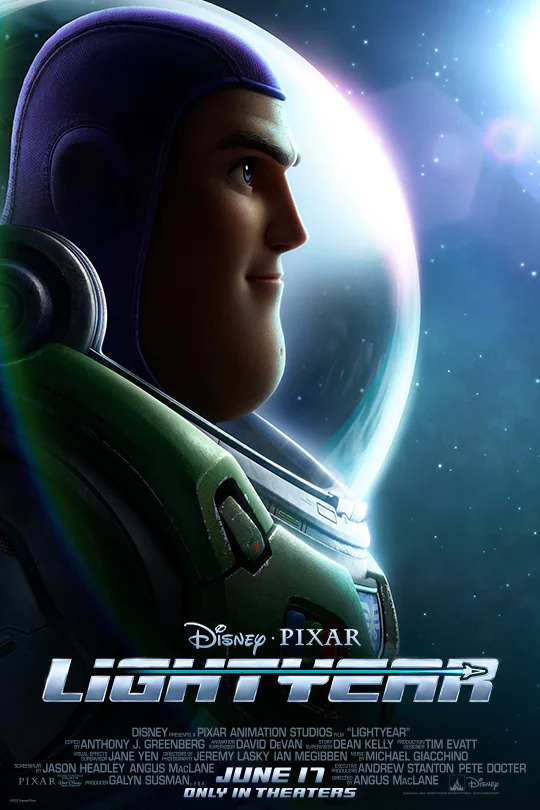
*THIS REVIEW CONTAINS SPOILERS*
Guys, let's just be honest for a second.
This is essentially Toy Story 5, or maybe Toy Story 4 1/2, disguised as a kid-friendly version of The Martian.
Let me ask you all a question I always end up asking myself every time an unnecessary prequel or origin story comes out, especially a Disney-sanctioned one:
"Did I really want to know how (blank) became (blank)?"
Nine times out of ten, the answer is usually "No".
I feel like filmmakers and storytellers are forgetting that we don't always need to give every popular character an ultimately flimsy or shoe-horned origin story that inevitably ends up only ret-conning or diluting what we loved about that character to begin with. Part of the fun of universally beloved characters is that they are universal, which requires a form of vagueness and negative space that allows them to be left open to interpretation in order to appeal to as many different types of people from as many different backgrounds as possible.
Take the Joker for example.
The best iterations of that character either forgo an origin story altogether or create one that works with what we already know about the character, and then shows a (somewhat) straightforward trajectory of how he become the killer clown we all know and love today, i.e. The Killing Joke.
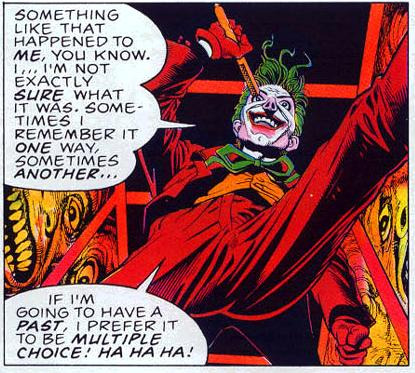
These types of characters, surrounded by this enigmatic air of mystery, are usually the most memorable and fascinating to us specifically because we don't know their origin story, and it allows us to fill in the blanks for ourselves and make the character feel like our own. By relinquishing this kind of creative control over to the viewer/reader, filmmakers and storytellers can relieve themselves of a tremendous narrative burden while helping their characters last longer in the collective minds of our popular culture.
So in a sense, a good origin story is not unlike a good plot twist.
Both work best when they answer questions and fill in gaps. And both fail when they leave us feeling more confused and poke more holes in the plot, thus ultimately sinking it.
If you want to read more, there is a great article that relates to this debate, especially when it comes to origin stories that try to make iconic female villains likable (ew) and sympathetic (double ew), and I highly recommend giving it a read:
Now don't get me wrong, this doesn't always mean that I don't enjoy origin stories. An origin story, like any other story, can be good when it is done right (just look at The Godfather Part II) especially when the creators approach the project with care and passion.
But oftentimes these origin stories are used by big corporate studios so that they can squeeze every last drop of profitability out of a character and their franchise, especially if it's a flagship figure from which the entire foundation of the studio was built upon. For example, New Line Cinema is known as the House that Freddy Built due to the success of Freddy Krueger in the original A Nightmare on Elm Street movie, which help launched the then-fledgling studio, not to mention countless sequels and spin-offs. But over time Freddy Krueger became more of a mascot than a threat with each entry, not unlike Buzz Lightyear for Pixar.
The character of Buzz Lightyear is kept largely intact here, thanks in large part to an earnest and believable performance by Captain America himself Chris Evans. And before you say anything: no, Tim Allen does not voice Buzz Lightyear here, and I for one think that's for the best. It'd be too distracting and it helps the movie try to stand on its own, except for when we have to slog through all the obligatory Toy Story callback shots, recycled lines, and every they-did-the-thing moment, and Lord knows there are plenty of those here. But here's the problem: leave them in, it's too faithful to the original to the point that it's basically copying and pasting; but if you leave them out, then it doesn't feel like part of the franchise, so why bother having the name on it at all. Either way, we lose.
But anyway, the change of voice could confuse younger kids so keep that in mind. During the screening I went to, a child insisted that this guy was not the real Buzz Lightyear.

But here's my biggest gripe with the movie.
The opening text of Lightyear declares that this movie we're about to see is the same movie Andy saw back in 1995, his favorite movie that inspired the Buzz Lightyear toy from Toy Story.
On the one hand, this disclaimer is a good way to get away with including kid-friendly sci-fi elements such as robot cats (I would live AND die for Sox), time travel, and alien lifeforms in an otherwise realistic-looking space movie.
But, excuse me for a second, I have to call bullshit here.
Do y'all remember what humans looked like in the Toy Story world back in 1995?
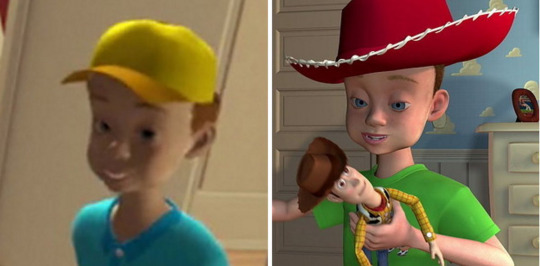
Yeah. Pure nightmare fuel with soulless soul-sucking eyes.
Now, in an incredible feat of gaslighting, this movie expects us to believe that THIS:
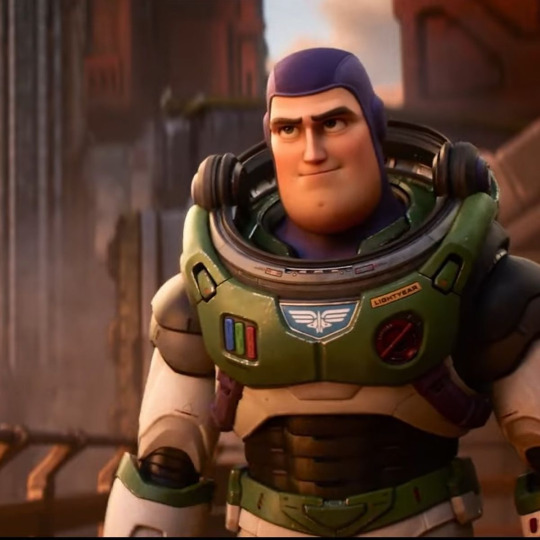
came out at the same time as THIS:

Lightyear is clearly a 2022 movie, with 2022 visuals and 2022 values, but it's trying to pass itself off as a 1995 movie and in that sense it fails miserably, aside from a few clever 90s-era callbacks (blowing on the navigation assistant IVAN like its a N64 cartridge and the computer boot-up sound). But this "framing device" (it's really more like a disclaimer) is ultimately a flimsy hall pass used to justify this movie's existence.
If they really wanted this setup to work, then they should've either fully committed to the 1995-ness of it all (stylizing the animation to fit the era like what Turning Red did for the early 00s, thereby matching the aesthetic and zeitgeist more earnestly) or make it a proper 2022 movie that could claim to be based off an astronaut who could've served as the basis for the Buzz Lightyear toy in that universe in the same way that Buzz Lightyear is based on (or at least named after) the real-life Apollo 11 astronaut Buzz Aldrin.
It feels like Pixar is trying to have their cake and eat it too by trying to give us the nostalgia of 1995 but without losing the advantage of being relevant, whatever that means.
But I would like to point out that Disney has already made a vastly superior Buzz Lightyear spin-off that is truer to the essence of the character and their world in the form of both the direct-to-video movie Buzz Lightyear of Star Command: The Adventures Begins (2000) and the criminally underrated Saturday morning cartoon TV show Buzz Lightyear of Star Command (2000-2001). They both match the spirit and tone of the Toy Story universe and serve as a much better spin-off than Lightyear, with funnier jokes and more unforgettable characters. Hopefully Lightyear can help turn people onto this show (please put it on Disney+, you cowards).

Quick side bar: I used to be OBSESSED with this show, like getting-up-at-ungodly-hours-to-watch-this-show-before-the-existence-of-YouTube level obsessed, especially with NOS-4-A2 the energy vampire, voiced by Craig Ferguson. Yes. THAT Craig Ferguson. BLOSC had a whole slew of awesome celebrity voices, including Patrick Warburton as Buzz Lightyear. PLEASE check it out and give it the love it deserves.
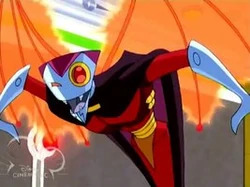
P.S. This NOS-4-A2 came out 13 years before the Joe Hill novel NOS4A2 and 19 years before the AMC series adaptation. Just saying. The people need to know.
OK, I need to stop, otherwise I will geek out and never stop.
So with all that said, the question you'll probably be wanting me to answer now is: "Should I see Lightyear?"
My answer, perhaps surprisingly, is "Yes."
Because even though Lightyear may go down in the history books as being lower-tier Pixar, that level is still above most other animation studios at their best. It's quite a feat for a studio that even their less-than-stellar offerings are still oftentimes better than most other animated movies out there (for the most part).
Okay, so what's the good stuff?
The first thing that comes to mind is, naturally, the top-notch animation. It's nice to see Pixar take this approach to character design, steering away from the typical disproportionately big eyes we're used to seeing in Disney movies, trying to make the humans more like real people while still giving them plenty of expression. And in all seriousness, there are some beautiful shots to be found in Lightyear, not just photorealistic but beautifully lit shots of space and sunsets (there's even a cool 2001: A Space Odyssey-style stargate because of course there is). I don't know if an animated movie can even get nominated for Best Cinematography, but I would sure love to see them try. And with computer animation getting more and more realistic every year, I suspect it's only a matter of time before that feat is accomplished.
And, rest assured, there will be plenty of Pixar moments that will make you, if not outright cry, then at the very least get teary-eyed. This is seen most effectively when *MAJOR SPOILER COMING UP* Buzz finds out that every trip he takes to try and get home results in him losing 4 years, during which time his friend and fellow Space Ranger Alisha Hawthorne (Uzo Aduba) continues to age, so every time he sees her she's either getting engaged or getting pregnant or watching her child graduate and essentially living her life without him, up until she dies of old age while he's away, and he doesn't even get to give her a proper goodbye in person. Now THAT's good storytelling. This sequence is expertly handled with tender loving care and really hits you in the feels (okay it's not quite as good as the first 10 minutes of Up, but come on, very few things are).
But most importantly, we get to see this unfold with a canonically queer woman of color in STEM.
In that sense, Lightyear takes one small step forward in term of mainstream queer representation, a step that's still not big enough to get very far but one that is definitely bigger than previous steps taken before it (I'm looking at you, Doctor Strange in the Multiverse of Madness). We get to see a major supporting character, Alisha Hawthorne, marry an Asian woman named Kiko, have a family with her, live a long and happy life, and even share an onscreen kiss with her wife that we actually get to see. It's sad that we still have to get excited over crumbs like this, but hey, suck it homophobes, love wins.
You could argue that Alisha becomes a fridged character whose only purpose was to serve a white man's story, a white man who gets to lead an otherwise pretty diverse cast, as if to say "don't worry, white guys, you still get to be the hero." But I would argue that Alisha is given enough of a likable personality and life outside of Buzz, albeit still viewed through Buzz's perspective, to avoid making her a background token black sidekick. If you were to take Alisha out of the story, the movie would be radically different.
The rest of the supporting cast is not exactly ground-breaking but they do get enough character development to help them avoid being totally forgettable, at least for a little while. I especially love the detail of Izzy, Alisha's granddaughter (voiced by my girl, rising star Keke Palmer), being a Space Ranger who's afraid of the vast vacuum of space (girl, I feel you). She also does a great job of underscoring the main theme of learning to embrace mistakes, especially our own mistakes (man, that message really hit me where I live). Finally, as far as villains go, this Zurg gets the job done, but the reveal of who's really behind Zurg is just too good to spoil here. Or, at least, I didn't see it coming.
But I think it's very telling that the best character in the movie is a robotic cat.
I'm just saying.
This is why we can't decide whether or not animated movies are for children or adults. You put a realistic-looking guy into space and give him a life-or-death mission in a story that most younger kids won't be able to follow, but we still need some sort of adorable (preferably animal) sidekick that we can turn into plushies and Happy Meal toys.
But, again, I would live and die for Sox.

The worst thing you can say about Lightyear is that it's a standard animated movie, one that I'm not even sure will properly entertain really young kids, unless they REALLY love Buzz Lightyear, but I think even that would be pushing it. But if you have an older kid or preteen who likes Buzz Lightyear and science, preferably a young girl of color looking for role models in STEM, then this could fit the bill. I bet that this would be a great movie to screen for science camps or middle school science classes.
Lightyear shows how, even if computer animation has come so far, dare I say, lightyears ahead of what came before, good Pixar-quality storytelling can get lost in space if it's not tethered to a strong enough base.
Now all we need is a gritty western spin-off starring Woody and then I'll be happy.
This is Cinema Seeker, signing off.
Thanks for reading!
My Rating: 2.5/5 meat-bread-meat sandwiches
P.S. There is a mid- and post-credits scene, so be sure to stick around for that if you're interested.
And for all you name nerds and prospective parents looking for cool baby names, here's a complete list of the Production Babies, listed in the credits as Future Space Rangers:
Ame, Anaïs, Anthony, Clara, Cora, Dean, Devon, Elan, Emmeline, Evren, Henry, Izumi, Jade, Luca, Mabel, Maggie, Mari, Matias, Mia, Mikayla, Otto, Rami, Sean, Simon, William, Zi-Ran
#lightyear#buzz lightyear#to infinity and beyond#chris evans#uzo aduba#keke palmer#taika waititi#dale soules#disney#pixar#disney pixar#evil emperor zurg#zurg#star command#buzz lightyear of star command#toy story
18 notes
·
View notes
Text
Let's Review: Jurassic World Dominion

*THIS REVIEW CONTAINS SPOILERS FOR JURASSIC WORLD: DOMINION and JURASSIC PARK (1993)*
Life always finds a way, especially if it's a long-running and long-beloved movie franchise. And both of those things always have to end eventually, despite our best efforts.
Jurassic World: Dominion takes the story started in Jurassic Park to its logical conclusion, crawling determinedly across the finish line and collecting a last place medal (Do they even give out medals for last place? Maybe a participation award would be more appropriate). But at least it finished, and that can be an accomplishment in its own right. And I can guarantee that there will still be plenty of people waiting in the stands, even after all this time, cheering it on.
This latest installment finally gives us a true Jurassic World. Not only are the dinosaurs out of the park, but now they're out in our world, living around us and unbalancing our entire delicate ecosystem. But it's not exactly a post-apocalyptic scenario. Civilization as we know it is still technically up and running, but the main question here is: for how much longer?
The movie shows how humanity has taken various approaches to adapting to this new world order. Some like Claire Dearing (Bryce Dallas Howard) have taken up dinosaur rights activism and are working to free them from illegal breeding operations. Owen Grady (Chris Pratt) has taken up the cowboy approach, rounding up herds and helping them find safer pastures. Others have used dinosaurs to create a booming black market with the purpose of fulfilling a perverse demand to sell and own these valuable animals (Did this element make anyone else think of Tiger King?). And then there's Biosyn, a company that is working on creating a sanctuary for dinosaurs and promises to use genetic engineering in order to, not make hybrids, but to find cures for genetic diseases. But, big shock, it turns out that they don't exactly have the best of intentions (Just wait until you see what they get up to here; your reaction will most likely be the same as mine: NOPE). Biosyn is led by *SPOILER COMING UP* clever in-joke Lewis Dodgson. And yes, it's that Dodgson, the one from the first movie and the memes.
This time around, Dodgson (Campbell Scott) has gotten the complete 2020s tech villain makeover, which includes a calm Steve Jobs monotone, matching glasses, and casual business attire (with the sleeves rolled up, of course). He's a pretty basic, forgettable bad guy who gets his fitting comeuppance in the end.
This image says it all:
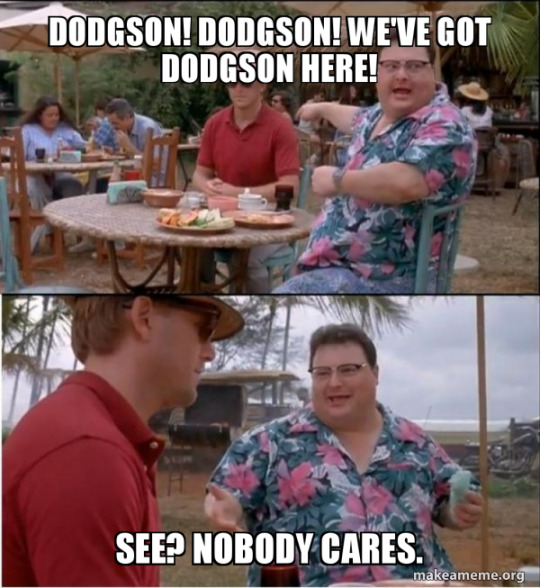
Speaking of bad guys, this movie may make you question who you're supposed to be rooting for: the dinosaurs or the humans. In the first movie it was pretty obvious but now it feels like those lines are getting more and more blurred. On the one hand, yes, dinosaurs are dangerous and should not be left unchecked in the wider world of human civilization, lest they go around eating people, wiping out livestock, and causing all kinds of general mayhem. But on the other hand, the movie does take some time to try and convince us that these are animals and they deserve to live and be protected in the same way that we work to protect endangered species such as tigers. In terms of thematic material, it's not a very deep puddle but it's still a puddle that can hold some water (it kinda evaporates by the third act, albeit not completely).
It's so fascinating to see how movie villains and our notions of who gets labeled as the villain change over time. In a similar vein to how Native Americans were the undisputed villains of cowboy movies (i.e. The Searchers) but have slowly started to become well-rounded protagonists in their own right (shout-out to Reservation Dogs), the velociraptors, who used to be the undisputed villains of Jurassic Park, are now less vilified here and, although not exactly the heroes, they get to be allied with the heroes while still being the wild animals that they are.
There's a fantastic scene early on when *SPOILER COMING UP* we see the velociraptor Blue and her offspring, later named Beta, running around in the snow. The way that they stalk prey reminded me of Bambi going out with his mom in the meadow (thankfully there's no dead mom in this scenario).
Now imagine being able to take the empathy that we traditionally reserve for cute animals like Bambi and his mom

and apply it to velociraptors

Reminder: we've already done it before (Remember that cute baby velociraptor hatching from its egg in Jurassic Park?)
Now it can be tricky to spend too much empathy on something that is actively trying to kill you (which always eventually happens in these movies), but by the end the movie figures out how we could potentially co-exist peacefully with dinosaurs.
Quick side bar: If anyone wants to go off on this movie for being too "woke" for trying to address issues such as climate change and animal rights, this is the part where I remind you that this franchise has been grappling with the moral and ethical repercussions of bringing back dinosaurs since the beginning, so please take your complaints elsewhere.

Now that I've gotten you to start thinking about Ian Malcolm, I feel like now's the best time to mention that this movie sees the triumphant return of the OG Jurassic Park trio of Dr. Alan Grant (Sam Neill), Dr. Ellie Sattler (Laura Dern), and of course Dr. Ian Malcolm (Jeff Goldblum), who keeps it real and gets some of the best lines in the movie. He's the only character who can convincingly pull off a line like "You made a promise to a dinosaur." and make it work.
That's, THAT's the magic of Jeff Goldblum.
The veterans and newcomers work off each other very well here (Claire and Ellie trauma bonding is a particular highlight). But if I could give out an MVP award, I would easily give it to DeWanda Wise's badass pilot Kayla Watts.

Now I was already pretty excited to see that DeWanda Wise was going to be in this movie. I'm gonna pull out my hipster glasses for a second and mention that I liked DeWanda Wise before it was cool, namely from her work on the Netflix series She's Gotta Have It, the criminally underrated TV adaptation of Spike Lee's 1986 film. I did have some reservations, namely that she would only show up for one scene before getting swiftly killed off. Fortunately, not only does she get to live, but she actually gets to be a cool character (with an arc and everything) and play an important part in the plot. I almost wish that there was another sequel coming out, or even a spin-off, just so I can see more of her. Or maybe an Indiana Jones reboot.
I don't know, she's already got the look and the vibe down.
Let's make it happen, people!
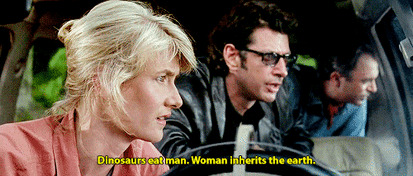

This movie definitely steps up in terms of diverse, feminist representation. There are significantly more people of color in prominent roles as both heroes and villains and, as you can see from the poster, there are more women in the main cast. This movie easily passes the Bechdel test (wherein two, preferably named, female characters speak to each other about something other than a man) and is able to achieve gender parity to such an astonishing degree that at one point, I was shocked to see that the female characters actually outnumbered the male characters (this NEVER happens, especially in big sci-fi blockbusters). Plus, I'm happy to report that everyone, male and female, is wearing sensible clothes and appropriate footwear (no high heels here).
If you're interested in reading more about this, check out this article. It was a fun read.
Now with that said, there could always be more WOC and BIPOC characters on screen, and sadly there is still no discernible queer representation to be found here, even though there's one line uttered by Kayla Watts that comes so tantalizingly close, that got me so excited and quietly fist-pumping in my seat over the possibility of seeing a queer woman of color in a Jurassic Park movie:
"I like redheads, too."
This is a line that refers to Claire, who shares several scenes with Kayla and, if you squint, you can sense some potential chemistry going on there. But unfortunately, nothing comes to fruition here.
But come ON, guys! Why would you throw in a line like that if you didn't want me to obsess over it?!?
For anyone looking to read more about this issue, check out this awesome article:
Although I'm glad that no prominent characters get killed off, it does bring up a glaring error with this movie: there is an overabundance of plot armor going around. For those of you who may not be familiar with this term, plot armor is a narrative phenomenon in which main characters are able to survive dangerous situations that no one should be able to survive, specifically because they are main characters, in order to serve the plot. But part of the excitement of the original Jurassic Park was that everyone was in danger and it felt like anyone could get killed at any moment. But I sense that, in a ploy to keep a PG-13 rating, the onscreen violence and chomping is significantly downsized, probably to avoid complaints from parents (God, can you imagine what this movie would've looked like if it had gotten an R rating? I can).
Now with that said, there are some great moments of suspense to be found here. I'll even go under oath and say that they are some of the most nail-biting moments in the franchise since the raptor kitchen scene in Jurassic Park. And *SPOILER COMING UP* both of them involve water. One is when Claire is in the wilderness, crawling military-style through the muck in order to escape the Giganotosaurus and ends up underwater, holding her breath for dear life. The other one involves Owen and Kayla trying to fend off a Pyroraptor whilst navigating across literal thin ice.
If this image is enough to make you want to hold your breath, then clearly someone is doing something right.
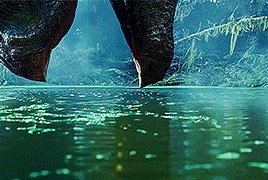
Bottom line: This is definitely a popcorn movie that you'll probably enjoy while you're in the theater but you may most likely forget about in a day or two, the same amount of time it would take for your popcorn to pass through your digestive tract. But I'm willing to bet that you still enjoyed that popcorn and therefore have no regrets.
And THAT's chaos theory.
I would like to end this review with a word to the wise from our favorite chaotician Dr. Ian Malcolm:

Thanks for reading!
My Rating: 2.5/5 baby velociraptors
#jurassic world dominion#jwd spoilers#jurassic park#chris pratt#owen grady#bryce dallas howard#claire dearing#laura dern#ellie sattler#jeff goldblum#ian malcolm#sam neill#alan grant#dewanda wise#kayla watts#mamoudou athie#ramsay cole#bd wong#henry wu#isabella sermon#maisie lockwood#justice smith#franklin webb#colin trevorrow#jurassic world#jurassic world dominion spoilers#clever girl#dinosaurs eat man woman inherits the earth
5 notes
·
View notes
Text
Let's Review: Top Gun Maverick

*THIS REVIEW CONTAINS SOME SALTY LANGUAGE AND SPOILERS FOR TOP GUN (1986) AND TOP GUN: MAVERICK*
When I was a kid, my parents would take me to Jones Beach to see the Blue Angels fly in the annual air show every Memorial Day weekend. It was always so exciting to see them take to the sky, spinning and barrel-rolling and hovering and looking like they were going to collide only to turn and whoosh past each other at the very last minute, jet streams trailing behind them. You always knew that, God willing, no one was ever going to get seriously hurt (these were trained professionals, after all) but it was still such an amazing sight to see, a perfect spectacle to usher in summer.
Top Gun: Maverick is like a good air show, expertly piloted and the perfect movie to start off the official summer movie season.
Now let's ride into the Danger Zone.
It's been over thirty years since Top Gun and Pete "Maverick" Mitchell is played once again by Tom Cruise, revisiting the role that made him a movie star and launched his career into the stratosphere. Maverick is still flying for the U.S. Navy, but it seems as though he's been living his life on autopilot. He's spent his entire career deliberately avoiding promotion and working not to move up in rank so that he can continue to stay in the sky. But one day, at the behest of his former rival Tom "Iceman" Kazansky (Val Kilmer, in a brief but heartfelt return to one of his most iconic characters), Maverick is sent back to TOPGUN to train a new batch of pilots for a dangerous and seemingly impossible mission. These new recruits include the confident and cocky Hangman (Glen Powell), the steadfast Phoenix (Monica Barbaro), humble Bob (Lewis Pullman), and Bradley "Rooster" Bradshaw (Miles Teller), the son of Nick "Goose" Bradshaw, Maverick's old friend and former co-pilot, whose tragic death still haunts Maverick. He's only got a few weeks to turn them into a team, but along the way he still finds time to rekindle a romance with his old flame Penny Benjamin (Jennifer Connelly), a character who was briefly mentioned but unseen back in the first film, the daughter of an admiral who has had several unsuccessful dalliances with Maverick in the past. Maybe this time they can finally make it work, unlike his relationship with Charlotte "Charlie" Blackwood, who is effectively persona non grata here and doesn't even get mentioned.
Rumor has it that Kelly McGillis was not asked to come back and according to her it was because she had the audacity to grow old and fat and look age-appropriate. (https://decider.com/2019/07/30/kelly-mcgillis-top-gun-maverick-old-fat/)

It seems fair to assume that the powers that be (i.e. the studio) did not think that Kelly McGillis in her present form would look good next to Tom Cruise, who par for the course gets to be completely exempt from that kind of ageist and sexist scrutiny, except for a few throwaway lines in the film where characters do rag on him for being an old man who's on his way out, but never in a way that diminishes his capacity to be an effective leading man. And on top of that, he gets to trade her in for a subjectively more attractive and younger leading lady.
Now with that said I would like to acknowledge that Jennifer Connelly, who is currently 51 and thriving, is no fresh-faced, bright-eyed ingénue and Penny Benjamin is no stranger to heartbreak, giving her a no-nonsense but still enjoyable back-and-forth with Maverick. I enjoyed their relationship much more than I ever did with the "romance" in Top Gun, where Charlie's credentials as an astrophysicist were effectively undermined by her under-the-desk flirtations with Maverick and he basically harassed her (using karaoke, no less) into sleeping with him. As older characters, Maverick and Penny have a much more balanced dynamic, and Penny even gets to take the lead several times, something that Charlie was never able to do.
When it comes to the canon, I chose to believe that Charlie was able to figure out that her relationship with Maverick was toxic (I mean, he followed her into the ladies' room for Christ's sake!) and ultimately dumped his ass to take that job in Washington and never looked back. And Kelly McGillis is happy to do the same.
Good for her.

Maverick may be older but he's still as cheeky and rebellious as ever, but at least it serves a purpose here, unlike before when he always knew he was the best so therefore he never felt the need to follow the rules because, you know, he was always right, even when he was wrong (you can call it confidence, I call it entitlement). It's almost as if people in the Navy were shocked to find out that a guy who calls himself Maverick turns out to be a bit of a non-conformist (again, you can call it rugged American individualism, I call it being an asshole).
I swear, if Maverick were a real person he would've been swiftly court-martialed and fired several times over, and yet the narrative frames him as a hero who's always in the right and continually gets to be absolved of things that no one else would ever get away with. When I was watching Top Gun, I found myself siding more with Iceman than with Maverick, the EPA to his Ghostbusters.


While I'm on the subject of Iceman, I just want to briefly discuss his scene before I get back to my original point. It can be tricky to integrate a real actor's personal struggles into a movie, especially if those struggles can affect the production, whether it's health issues, drug addiction, or an actor's untimely death. But here, Kilmer's real-life struggles with throat cancer and the fallout from that are gracefully woven into his scene with Maverick and he gets to deliver a powerful, emotional performance with very minimal dialogue and a keyboard. A scene like this is a screenwriter's dream, because a scene like this requires both the writer and the actor to convey a lot of emotional heavy lifting with only a handful of carefully chosen words at a time and every single word has to count, and it does. It is hands-down my favorite scene in the movie and Val Kilmer gets to carry himself and Iceman with dignity and fortitude and *MAJOR SPOILER COMING UP* although Iceman dies shortly afterward, we still get some hope that this is not the end for Val Kilmer and we feel like we haven't seen the last of him.
(If you want to learn more about Val Kilmer and his career, check out the excellent documentary Val, streaming on Amazon Prime.)
Anyway, back to my point.
This new Maverick still has that defiant spirit but it is now kept in check (for the most part) by an older man's experience and understanding as well as a growing awareness of his own limits and a creeping sense of his own mortality. He still gets to get away with being reckless and defying authorities (against the stern likes of Ed Harris and Jon Hamm in this case) but here it feels more forgivable, and I think that's because they have such a tight deadline to prepare for their mission that they're desperate for anything that can work. Plus, this time Maverick is able to explain why his methods are necessary and how they serve the mission. Although initially reluctant to return to TOPGUN (the film lets it slip that he only lasted two months as an instructor after the last movie ended), Maverick proves to be an effective, if unorthodox, teacher.

Now that we're on the subject of flying, I finally get to talk about the main reason why I wanted to see this movie on the big screen: the in-flight sequences. If you were to find out that they were essentially remaking Top Gun (although this is technically a sequel), the first thing you're probably going to say is that they can't do that because they're just gonna use CGI all over the place. Well I'm here to report that Top Gun: Maverick does no such thing. With the exception of some shots, most of what you see onscreen is REAL. That means that the actors, who had to undergo extensive G-Force training, are flying actual aircraft up in the sky, and they put the camera straight into the cockpit so that we get to be right up there with them all the way. This immersive and viscerally real approach makes the dangers of flying feel all the more real, and the movie makes us aware of the physical toll of going up against g-forces. It feels easier to feel your adrenaline rise and feel invested in the action when you know that the action is real. I swear to God, my heart stopped several times while I was watching this movie, which means that they're clearly doing something right.
It's so telling of how accustomed we've become to CGI that when we see something real onscreen, it blows our minds and amazes us, as it should, especially when it's a real hypersonic scramjet flying through the desert trying to reach Mach 10.

Side note for those with potentially weak constitutions: If you can watch these GIFs without getting nauseous, then I think you'll be okay to see this in theaters (God help the brave souls who choose to see this on a proper IMAX screen or one of those dome theater screens. One's milage may definitely vary here. I was able to watch it fine and I'm terrified of flying and heights, so hopefully that helps).



The last thing I want to explore here is whether or not this movie and the Top Gun franchise glorifies the military. It's impossible to ignore the fact that Top Gun was, and can still be, a major recruitment tool for the Navy. Back in 1986, they had tents set up in some theaters so that moviegoers could enlist as soon as they got out, and according to IMDB there was a 500% increase in the number of recruits who were looking to join the Navy aviation program as a direct result of seeing the movie.
Now there's nothing wrong with wanting to join our nation's military forces if you feel compelled to serve our country of your own volition. I think that what most people were concerned about was whether or not Top Gun serves as propaganda and promotes jingoism, which is unfortunately becoming a negative extreme in our country right now. But I'm not here to judge or to preach. I get it, we just want to go to the movies and forget about politics. But it feels increasingly impossible to just enjoy anything without considering every problematic or pernicious angle for fear of being on the wrong side of public opinion. While I personally believe that it is possible to be both critical and enjoy something at the same time, I think that Top Gun: Maverick manages to avoid going the Michael Bay route of military glorification. The threat is vague enough so as not to be tied to any specific entity and thus it feels easier to enjoy watching our heroes carry out their mission and eventually triumph (I don't think that's much of a spoiler, this is a Hollywood movie after all and the good guys always win).
So here's my bottom line. Top Gun: Maverick accomplishes one of the rarest feats in Hollywood. It's a sequel that manages to be not only better, but far superior to the first movie, and for many reasons: the in-flight sequences are deftly filmed (no shaky cam here), the story is tighter, more exciting, and easier to follow this time around, it's actually funny when it wants to be, the characters and their relationships (both old and new) are interesting and make you care about them.
With that said, I do wish that there had been more focus on the relationship between Maverick and Hangman, who's essentially a younger version of Maverick. It would've been nice to see Maverick get a taste of his own medicine and come face-to-face with his own cocksureness, but this time as the authority figure and not as the rebellious youth. That would've made for a fascinating character arch, but I guess that's not really the point here. Speaking of cocks, there is sadly not as much overt homoerotic tension and unintentionally homoerotic lines as there are in the original (no hard-ons or riding anyone's tail here, I'm afraid), although perhaps Hangman and Rooster can be crowned the new honorary queer-coded couple and take that crown from Iceman and Maverick. But rest assured, there is still a greasy shirtless sports scene on the beach, which should satisfy fans and moviegoers (and then some). Top Gun: Maverick really knows how to give the people what they want, paying enough homage to the original while still looking forward and giving us something new.
This is the perfect popcorn movie to kick off the 2022 summer movie season and the best is yet to come.
I would like to end my review on this note, a line that is aimed at Maverick but could easily be used to describe Cruise and his character: "You can't get a promotion, you won't retire, and despite your best efforts, you refuse to die."
I couldn't have said it better myself.
My Rating: 3/5 aviator glasses
P.S. Do yourselves a favor and check out Glen Powell's comedic chops from one of his earlier acting roles on the underrated horror comedy Scream Queens. This scene is perhaps the greatest thing to come out of television from the past 10 years and it gives me life.
Enjoy!
vimeo
#top gun maverick#top gun#maverick#iceman#tom cruise#val kilmer#miles teller#glen powell#hangman top gun#rooster top gun#rooster x hangman#maverick x iceman#jennifer connelly#ed harris#jon hamm#monica barbaro#kelly mcgillis#i feel the need#the need for speed#danger zone#Vimeo
90 notes
·
View notes
Text
Let's Review: The Bob's Burgers Movie
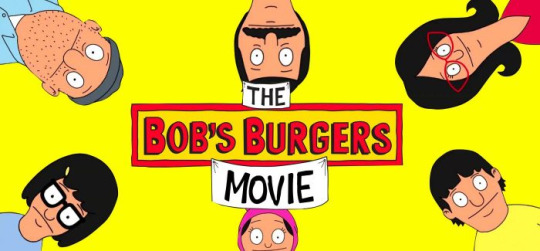
*THIS REVIEW CONTAINS SPOILERS FOR THE BOB'S BURGERS MOVIE, AND ALSO THE OCCASIONAL BURGER METAPHOR*
The recipe for a good Bob's Burgers movie is not unlike the recipe for a good cheeseburger: the main ingredients usually stay the same but, if done well (or well done, if you will), those ingredients are enough to keep the customers happy and coming back for more. But what if this time around they get a better version of the thing they love? A burger that still has the same ingredients but maybe this time the beef comes from a better cow on a better farm, thus producing a better burger.
The Bob's Burgers Movie is that better burger.
It keeps all of the same ingredients that make the show so good, but somehow makes them even better while still feeling fresh and new.
This is series creator Loren Bouchard's feature directorial debut (which he co-directed with fellow Bob's Burgers collaborator Bernard Derriman), and he takes to filmmaking like a duck to water. One only has the watch The Bob's Burgers Movie to see what I mean. The animation in this movie is top-tier, especially when you compare it to the show's first seasons. The quality of the animation always got better and better with each progressive season, but this is something else. It reminded me of when I was a kid and my favorite Nickelodeon show would get the motion picture treatment and then I would get to see the amazing animation glow-up that would come with it. Even as a kid I could sense that the production quality was different from the show, with better linework, bright colors, and a more massive scope, all of which are definitely present here. Calling the animation here a glow-up would be a severe understatement. Even from the beginning, the world of Bob's Burger felt bigger and realer as we watch the camera glide all around Ocean Avenue, home of the titular restaurant. If the TV show was 2D then this felt like 3D, while still mainly being a traditionally animated movie, a rarity in this industry nowadays. Plus, the characters felt more alive and livelier, bouncing along with the opening number, almost like something out of an early rubber hose cartoon. The movie clearly had an impressive animation budget and they take every opportunity to flaunt it onscreen.
With this movie, Loren was able to make Bob's Burgers cinematic, and he effectively demonstrated a strong understanding of how to adapt a beloved TV show, especially a beloved animated TV show, to the big screen. He gets that storytelling in a TV show is fundamentally different than storytelling in a film. The show only has 22 minutes to set up a crazy scenario and then get us from Point A to Point B. But with a movie, the story has to be sustainable enough to get us through the 142 minute runtime, like a ship crossing the ocean, and if that ship is not built properly it's gonna sink. Luckily, Loren's built a sturdy ship with his script, which he co-wrote with fellow Bob's Burger's writer Nora Smith.
It gives every member of the Belcher family a clearly stated desire and goal that needs to be fulfilled by the end of the film: Bob and Linda want to keep the restaurant from financial ruin, Tina wants Jimmy Jr. to be her boyfriend, Gene wants to use his cool new homemade instrument to rock out with his band, and Louise wants to be seen by her family and her peers as brave and not as a baby. Loren was also smart enough to give the story stakes and keep us invested by adding a ticking clock in the form of a six-day deadline for the Belchers to pay back their loan to the bank. The story has bits of real-world drama sprinkled into the mix without overwhelming the tone or bogging the characters down.
The script also manages to find new depths within these familiar characters. This is seen most strongly in Louise's arch, which gets to explore why she clings to her iconic pink bunny ears, and it's surprisingly profound and heartfelt. Louise definitely gets the lion's share when it comes to character development in this film, but I think it's for good reason. She's always been the most outspoken and proactive character on the show so it makes sense that she plays an important role with driving the plot forward. But every character does get their moment to shine, and this courtesy also extends to the massive supporting cast, with each cameo sure to excite every longtime fan of the show (myself included).
Now with all that said, this is not a perfect movie. The latter half leading up to the climax felt a bit drawn out and the ultimate villain in this is a bit weak with a weak motivation and a weak villain song that could've been so much better. It saddens me to think that we might've had a memorable non-Disney villain with a truly great non-Disney villain song. But to be fair, it's not really the focus of the film and they still have fun with it and it doesn't ruin an otherwise amazing movie.
Bottom line: This is that rare and beautiful unicorn of a movie that manages to adapt a popular TV show while perfecting preserving everything we love about that show and can still stand on its own two legs as a good movie in its own right. It will satisfy both longtime fans of the original show and newcomers who've never tasted it before. A perfect crowdpleaser to kick off the summer movie season.
My Rating: 4/5 Burgers
Bonus Content:
Check out the Bob’s Burger themed menu options available to you if you choose to see the movie at your local Alamo Drafthouse!
And, yes, the burgers do come with fries.
Also, check out the Production Babies from the end credits if you’re a name nerd like me!
P.S. there's a post-credits scene so be sure to stick around for that if you're interested!
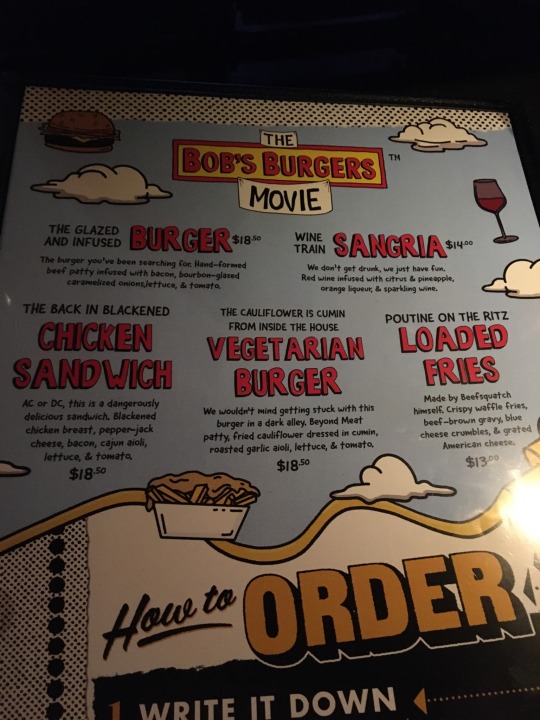
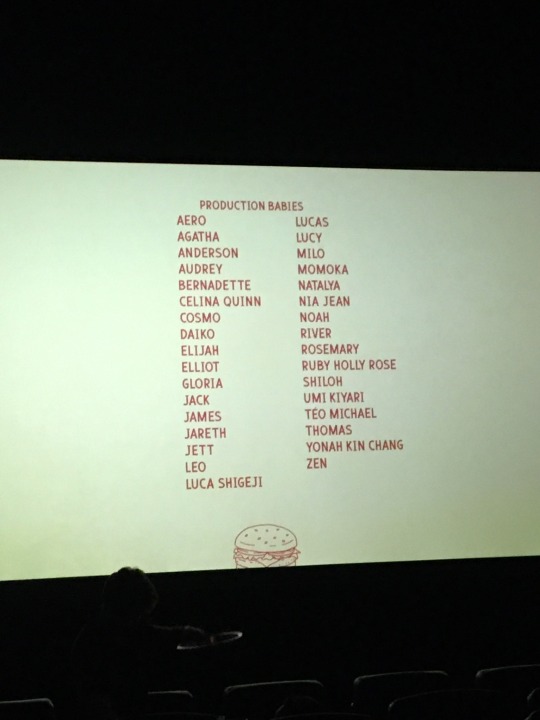
#bobs burgers#the bobs burgers movie#the bobs burger movie spoilers#bob belcher#linda belcher#tina belcher#gene belcher#louise belcher#h jon benjamin#john roberts#dan mintz#eugene mirman#kristen schaal
15 notes
·
View notes
Text
Multiple Verses on the Multiverse: Everything Everywhere All At Once in the Multiverse of Madness
*THIS REVIEW CONTAINS SPOILERS FOR DOCTOR STRANGE IN THE MULTIVERSE OF MADNESS AND EVERYTHING EVERYWHERE ALL AT ONCE*
As we find ourselves living out the Darkest Timeline, it’s easy to understand why we’ve been gravitating toward media and movies about the Multiverse, specifically Doctor Strange in the Multiverse of Madness and Everything Everywhere All at Once. Although these movies represent opposite ends of the Hollywood movie-making machine, the former being a big budget Marvel movie and the latter an original and outlandish indie film, they’ve both managed to touch upon something important we’ve been seeking in our present moment: the opportunity to explore not only different timelines where things are supposedly better, but also answer the question of what we would be like if we had made different choices throughout our lives. This critique will attempt to compare and contrast these two multiverse movies, which will inevitably find themselves in competition with each other, since apparently there can only be one. But instead of crowning a champion, my goal here is to shed some light on some of the meaningful parallels between these two movies, to offer two different paths to the same destination, a feat that would not be unwelcome in either of these cinematic universes. Like any story featuring the Multiverse, it can be quite daunting to figure out where to begin, where to find a proper starting point. After all, the possibilities are literally infinite. But I’ll do my best to find where some of these common threads merge or diverge.
Let’s get started.
Both of these movies use the Multiverse as a means to explore family dynamics and re-establish family ties. In EEAAO, despite all the fantastical hijinks and trippy visuals, it all boils down to a family trying to stay together while it is falling apart: Evelyn’s husband Waymond is seeking a divorce while their daughter Joy is trying to get her family, especially her mother, to accept her sexuality, and Evelyn is doing everything she can to keep the family business afloat while struggling with their taxes and the IRS. In Doctor Strange ITMOM, the core conflict is that Wanda is trying to use America Chavez’s power of creating portals to travel across the Multiverse and reunite with the children she created in WandaVision in order to have the family she’s always wanted.
Unfortunately, Wanda’s actions in her story color her as a villain, maybe an antihero at best, while Evelyn gets to be the hero of her own story, embracing the chance to break free from her mundane, everywoman existence and unlock her full potential as a hero, which is an incredible feat for any character, especially an older woman of color. Although Evelyn and Wanda are both mothers in their own right, Evelyn seems to get much more sympathy from her story than Wanda does in hers. After all, Evelyn gets to win and keep her family in the end, but Wanda (at least the main Wanda we follow throughout the movie) has to give up the thing she wants most and take herself out of the picture.
I wonder if this is because Evelyn is not as inherently powerful as Wanda. After all, Evelyn only gets to be a bad-ass when she blindly follows crazy instructions from Alpha Waymond, a stronger and cooler version of her own husband from another universe. But Wanda comes from a studio that has consistently struggled to include “strong female characters” in their movies in meaningful ways, when they even remember to include them at all.
It feels like Marvel is trying to punish Wanda for being so powerful by putting her in her place, by having the Darkhold’s influence over her strip her of any moral agency, by making her so monstrously powerful that she uncontrollably destroys anyone who stands in her way, driven by the socially acceptable motivation of maternal instinct (can you imagine if she did all this just for herself?), and whose goal can only be achieved through the subjugation of another female character, the symbolically if not-so-subtly named America Chavez. Wanda’s narrative has it set up that the only way to achieve her goal is not to work cooperatively with America, not to ask America for help that she would happily give, but to hunt this girl down, absorb her power and kill her in the process.
Are we starting to see the problem here? Would it be so horrible to have a powerful, morally complicated heroine who is still in control of her faculties and self-assured and confident in herself despite being imperfect? Is that really so much to ask for? Apparently so, according to Marvel movies. And yes, it has already been brought to my attention that having a Mexican-American character whose superpower is essentially crossing borders is definitely a misstep and should be seen as problematic at best and borderline racist at worst (emphasis on border).
On top of female representation and representation of minorities, each movie takes a swing at queer representation, specifically lesbian representation, and while EEAAO hits a solid homerun, Doctor Strange ITMOM manages to feebly take a base after several misses. Doctor Strange ITMOM does show that America has two moms, which is a noticeable step forward for a Marvel movie, but then they are briskly swept aside and never mentioned again, like minorities brought out for the official university photo as a show of representing diversity, so that Marvel can clear its conscious and check off a box just by doing the bare minimum and clearing the lowest bar. On the other hand, EEAAO has Joy, a main character who is a queer woman of color in a happy and healthy relationship that plays an important part in the story, and although she does become the main antagonist, we get to understand why she got there, we get to sympathize with her, and she gets to redeem herself in the end without having to change who she is as a person.
At the end of both movies, I was fascinated to find that both movies take advantage of imagery involving the third eye, albeit in radically different ways. With Doctor Strange, the third eye is a grotesque literal third eye that bulges from his forehead, a price to be paid for messing with the forces of the Darkhold (which is essentially the Necronomicon, which makes this movie a light Evil Dead reboot. I mean, it is directed by Sam Raimi after all, but I digress). In EEAAO, Evelyn’s third eye is a googly eye that she humorously adopts after embracing her husband’s philosophy of kindness and working to make the Multiverse a better place in order to combat the antagonist’s nihilism. At the end of the day, it is kindness that saves the world.
So after all of that discourse, here’s my bottom line: there can be more than one. This may sound shocking, but you are allowed to watch both of these movies and you are allowed to like them both equally, or unequally if you want. In our current climate of conflict and division, it can be easy to forget that we don’t have to live in extremes, that there is still a middle ground. My hope is that this critique will encourage conversation that will keep our minds open and keep us talking to each other.
After all, our clothes never wear as well the next day, and our hair never falls in quite the same way, but hopefully we’ll never run out of things to say.
4 notes
·
View notes